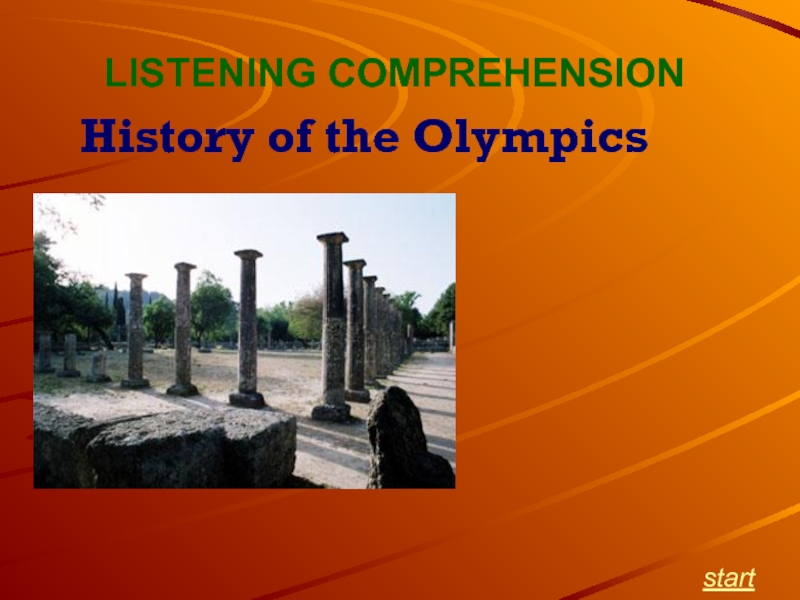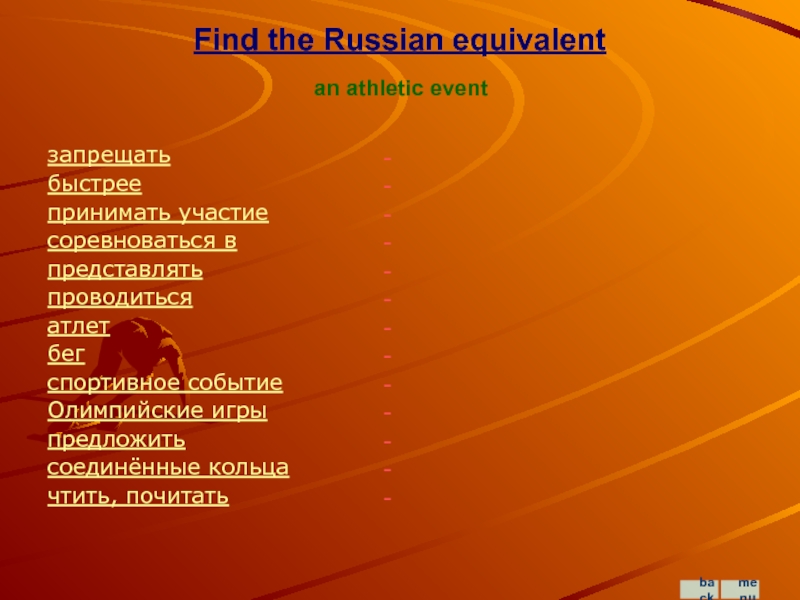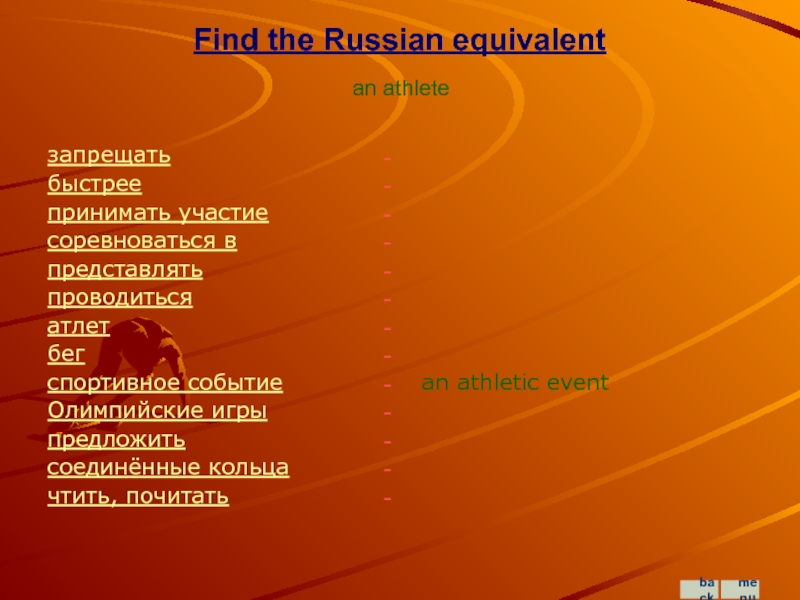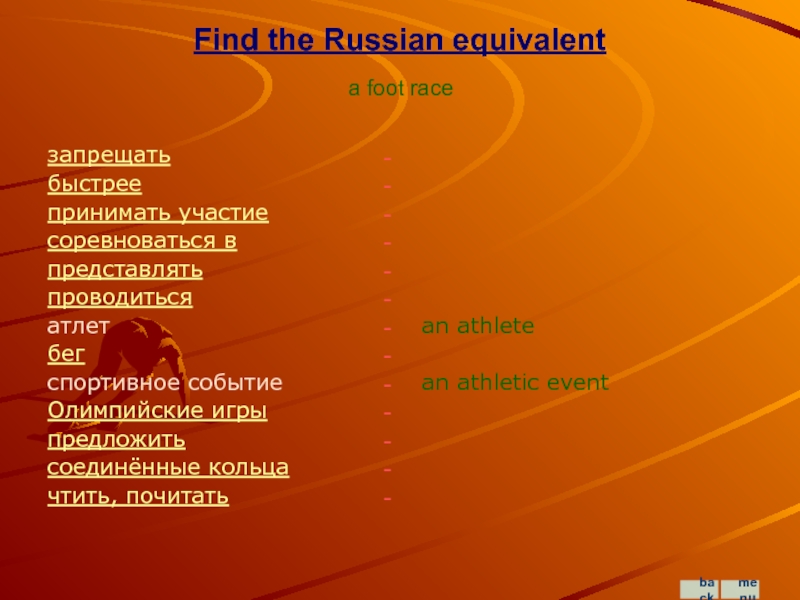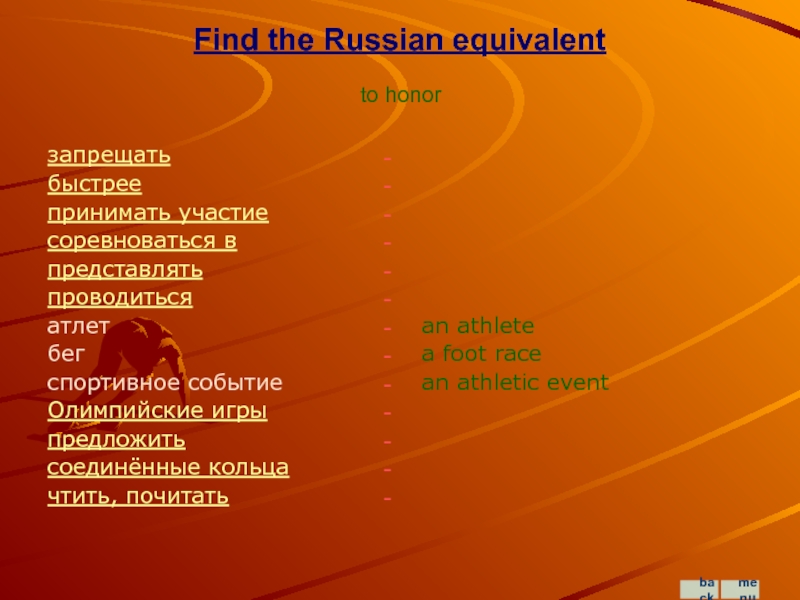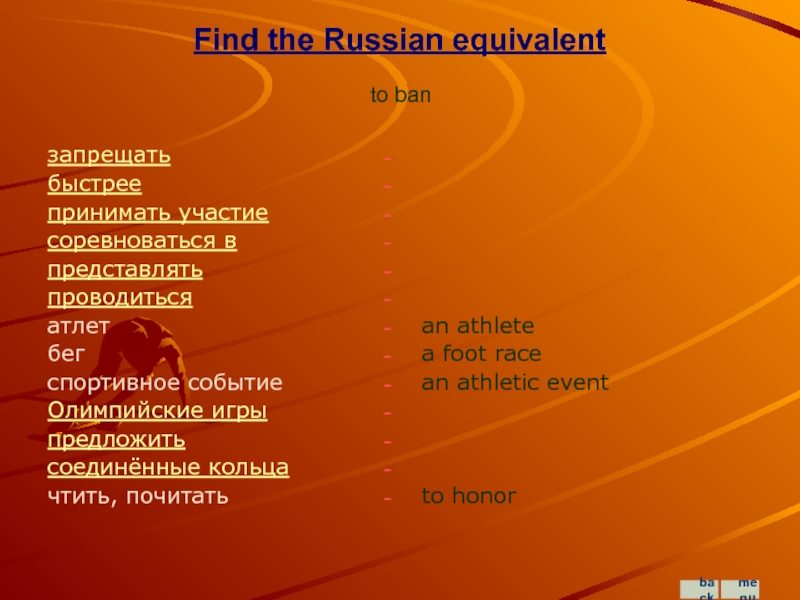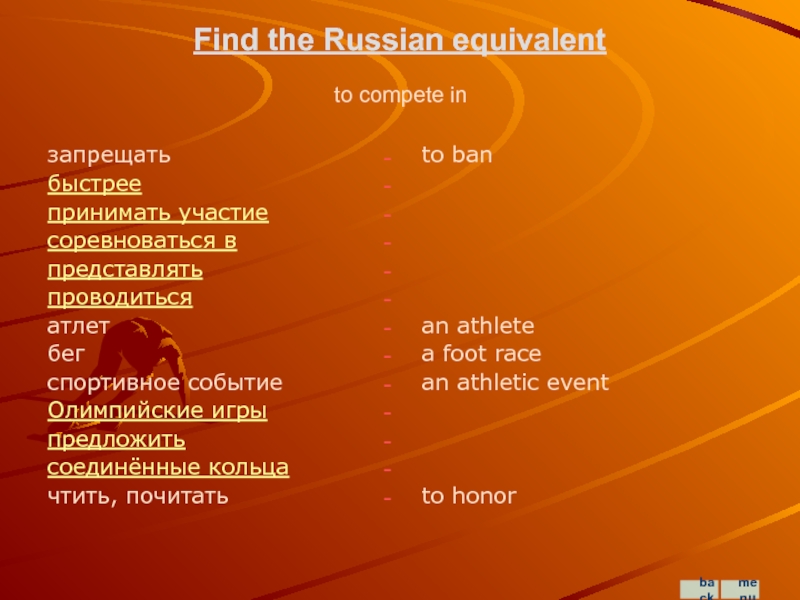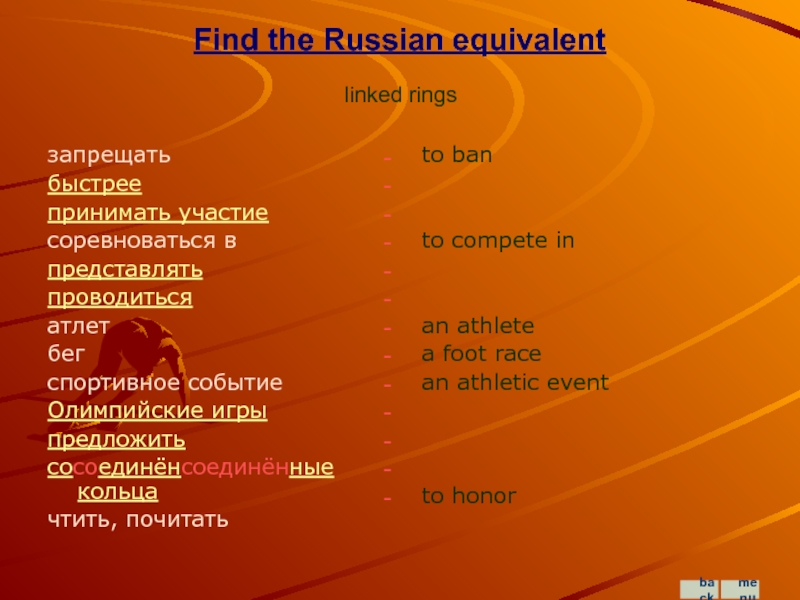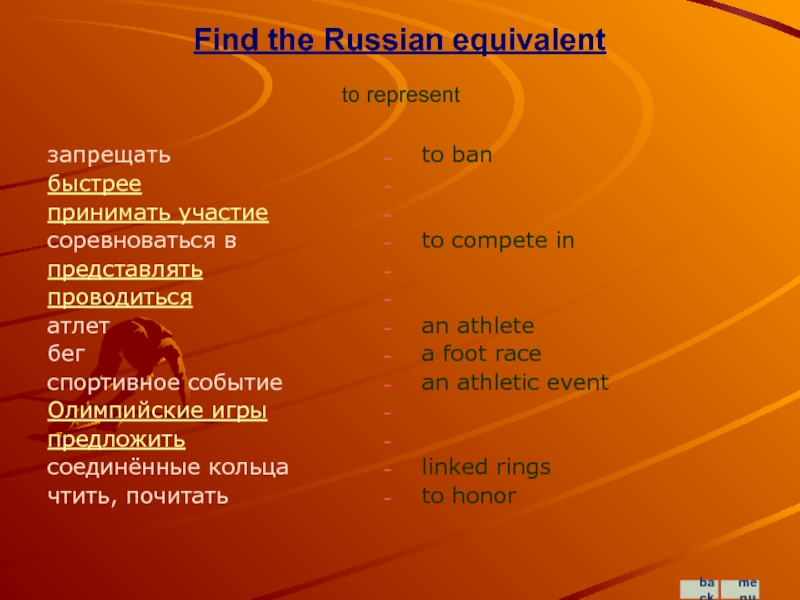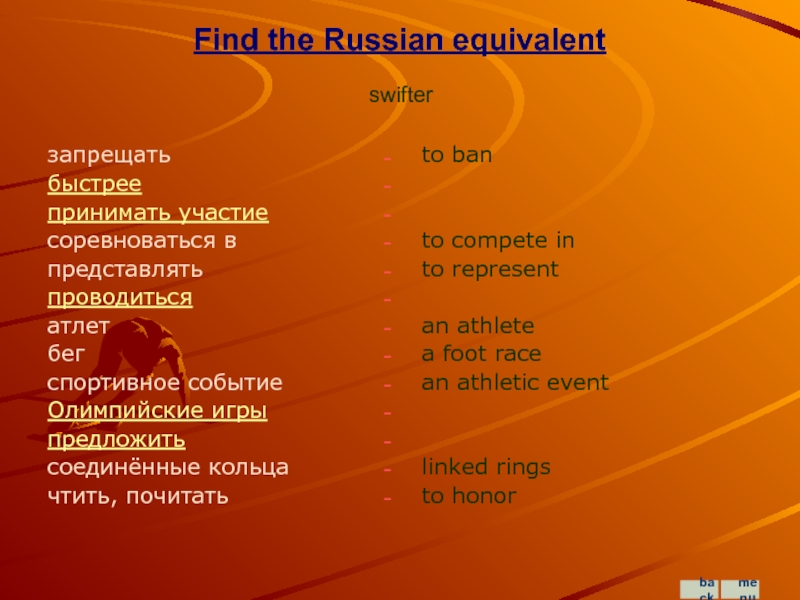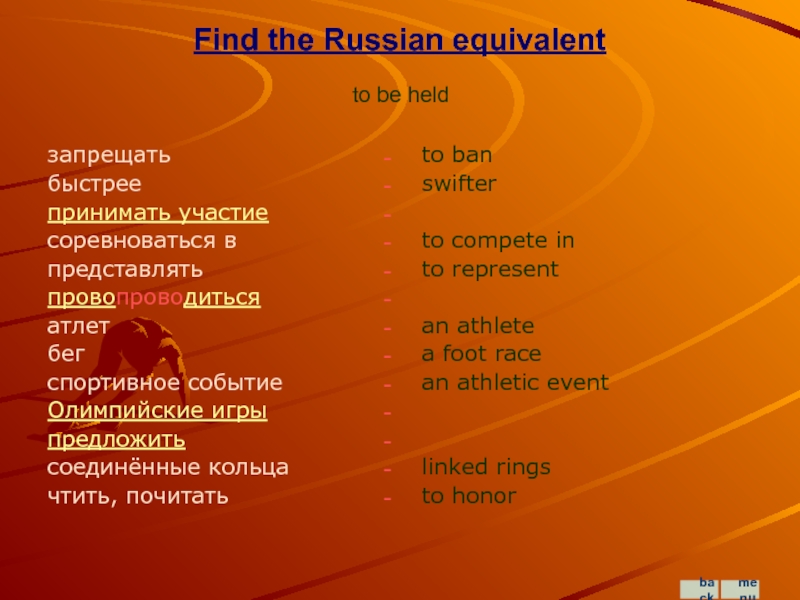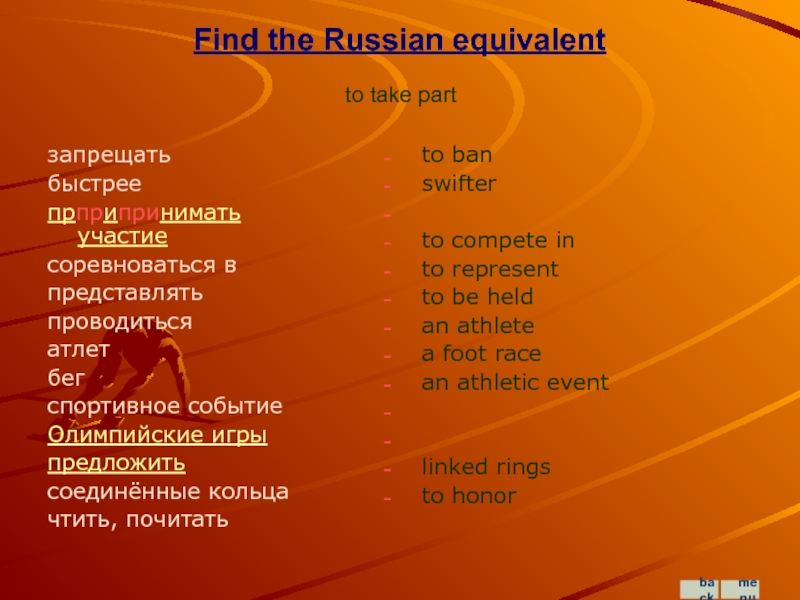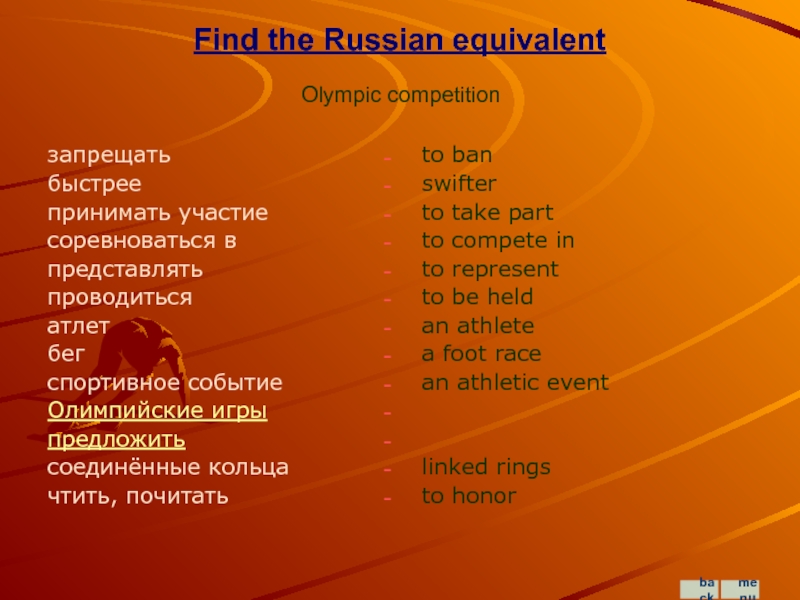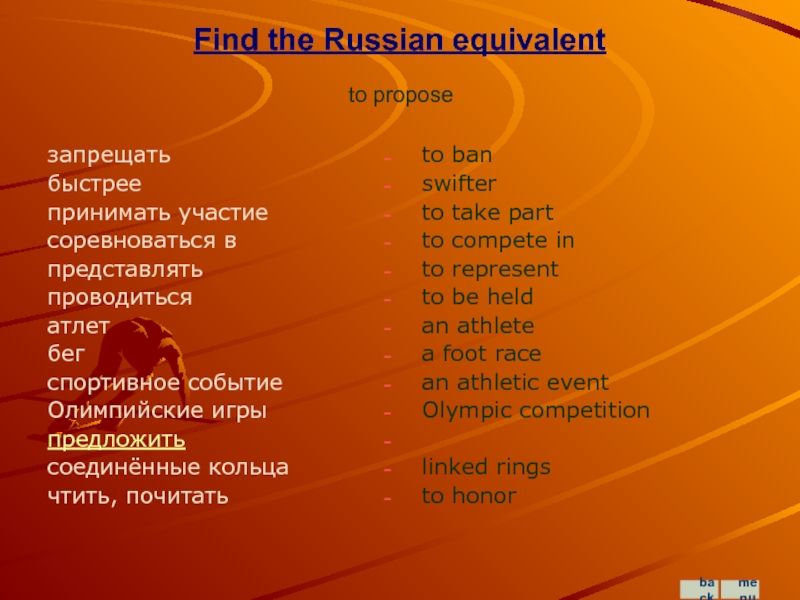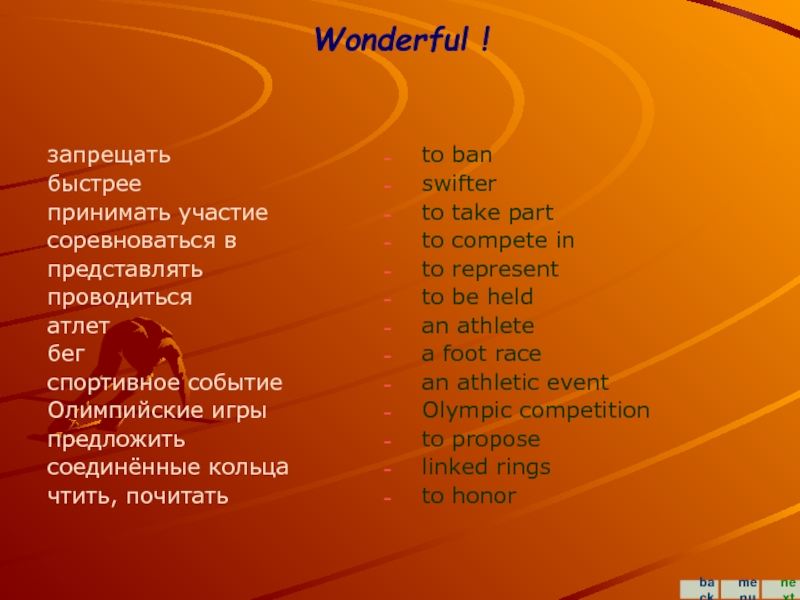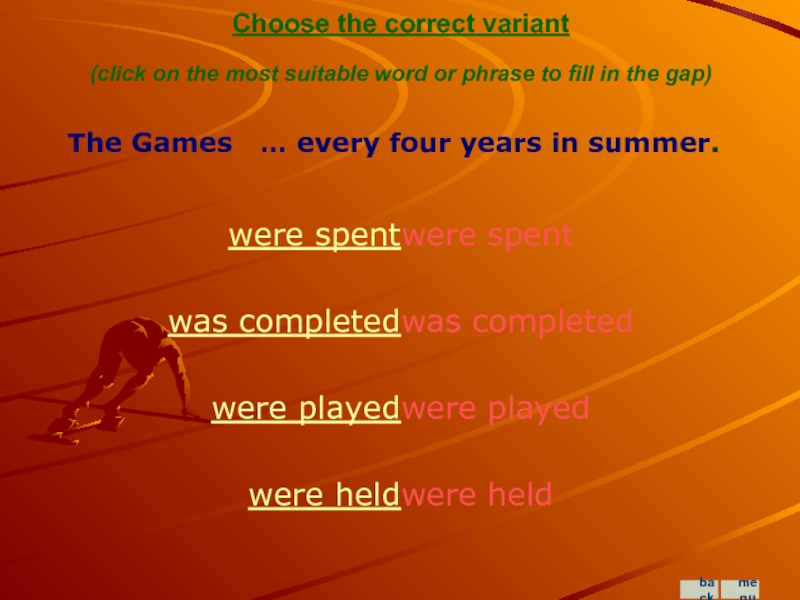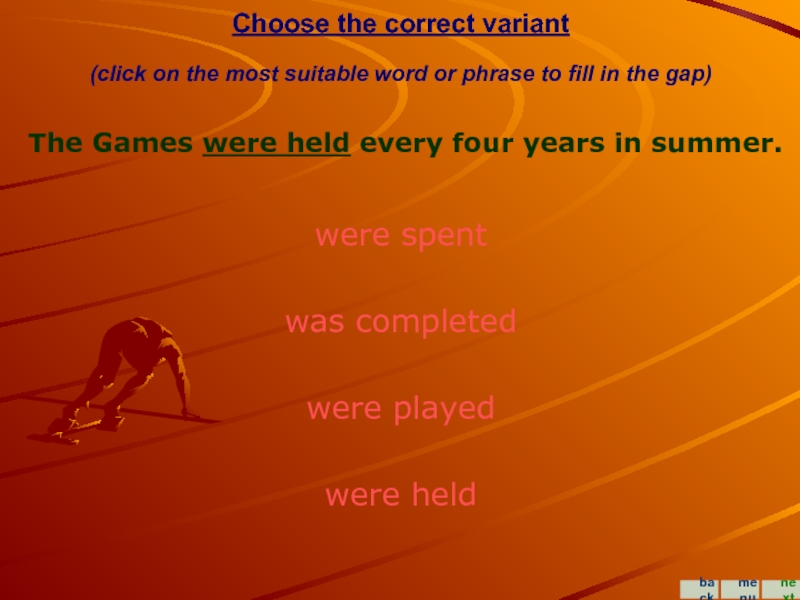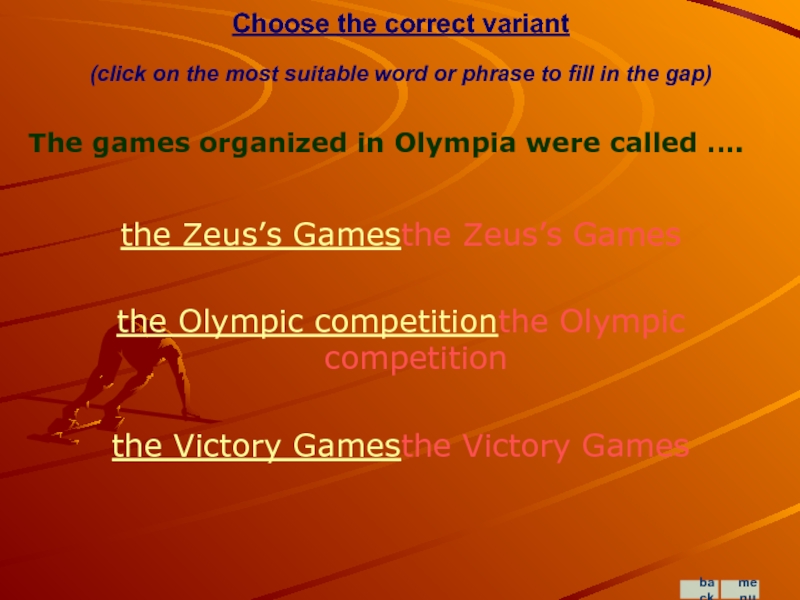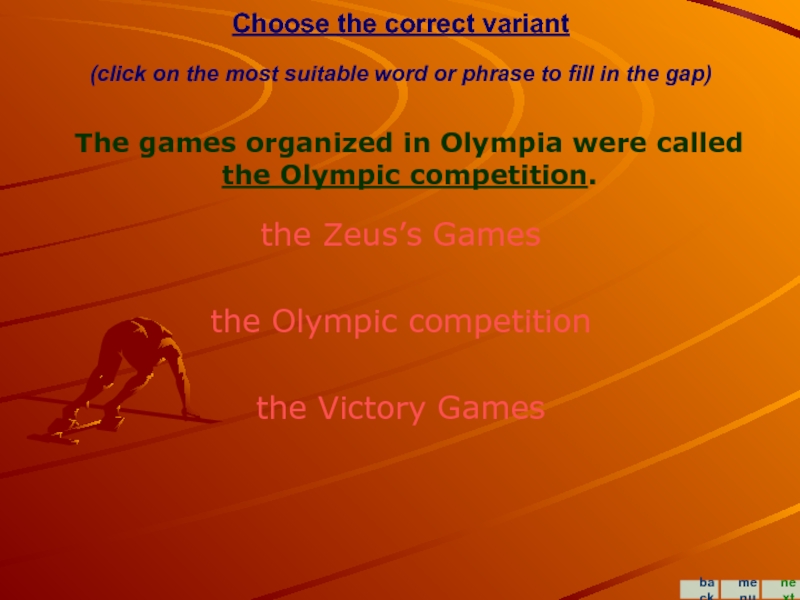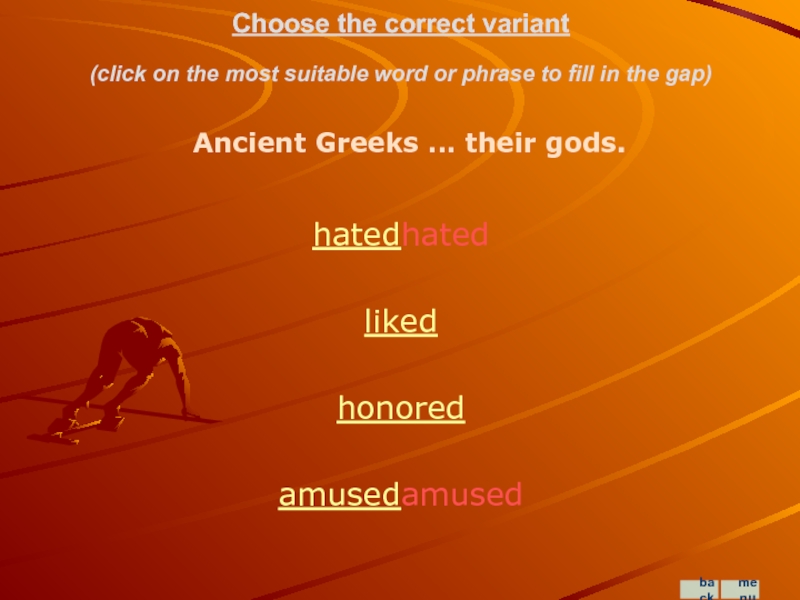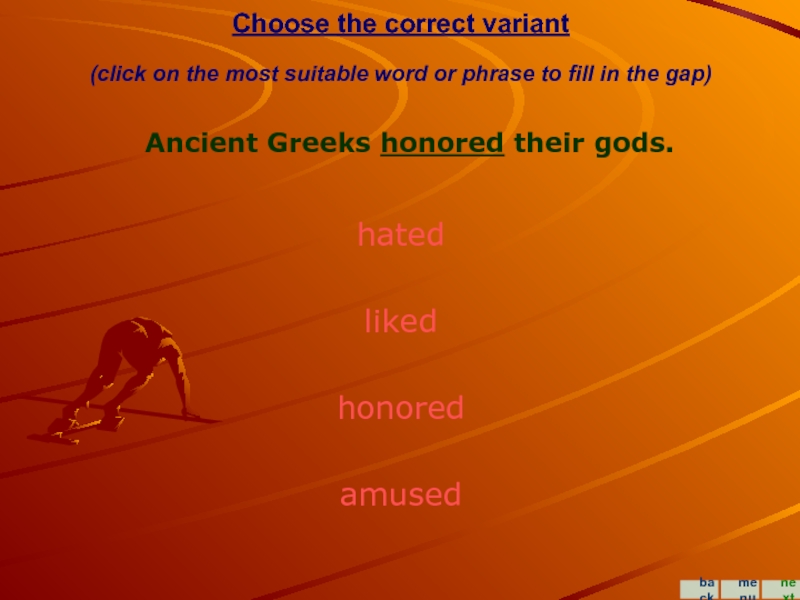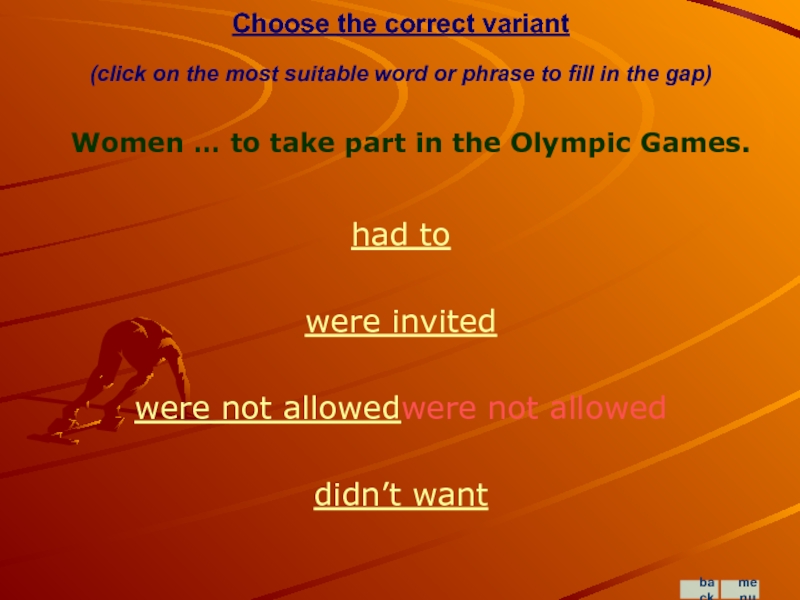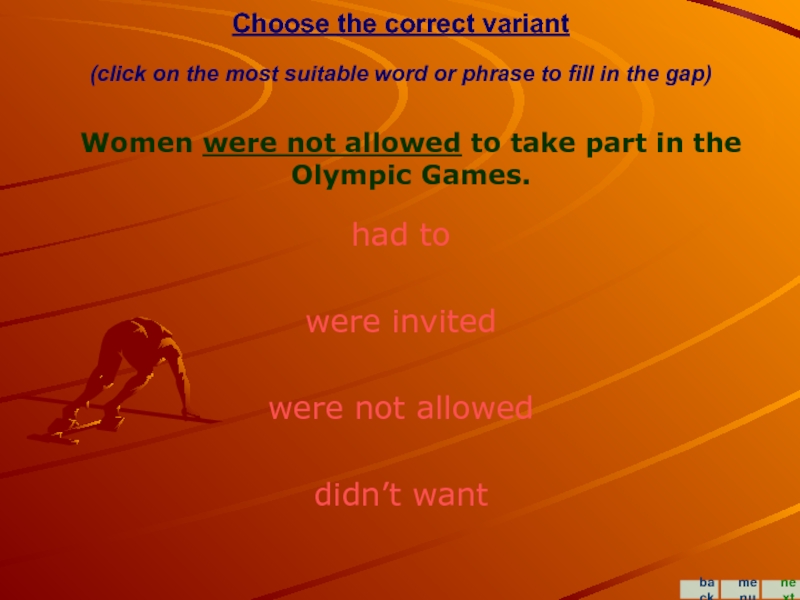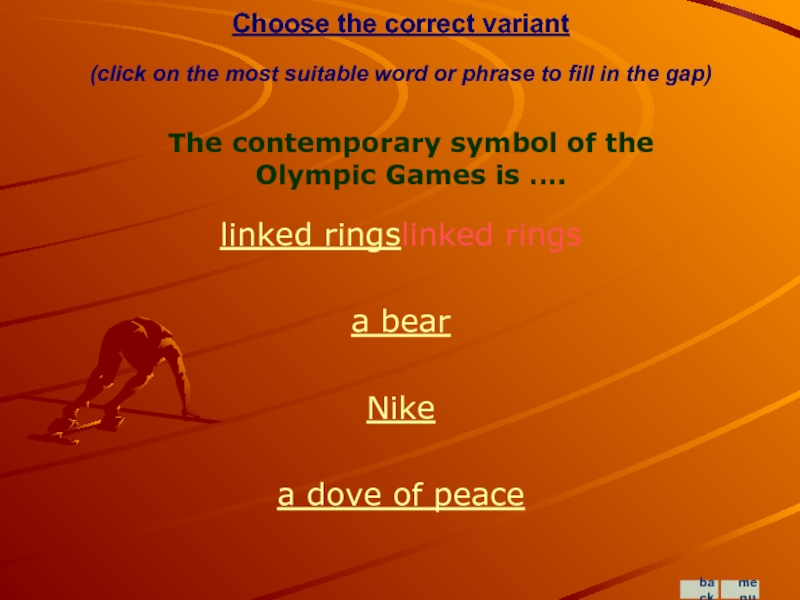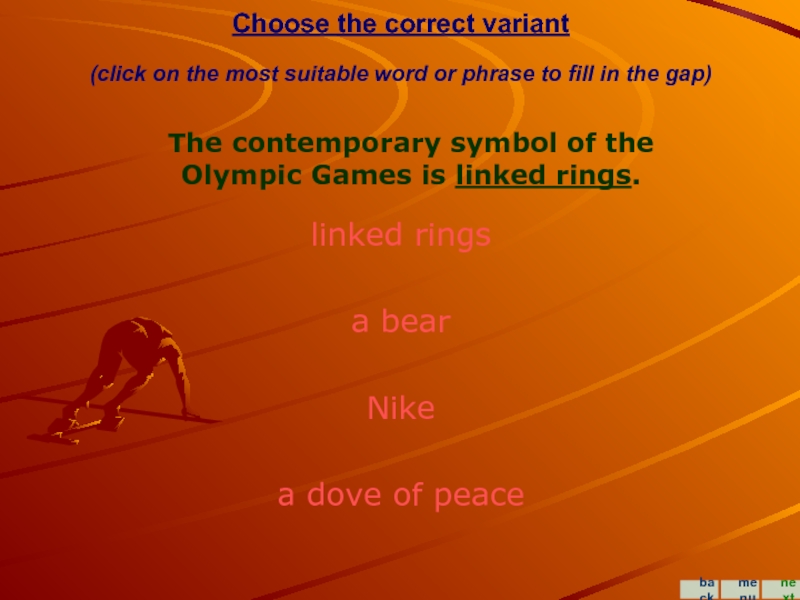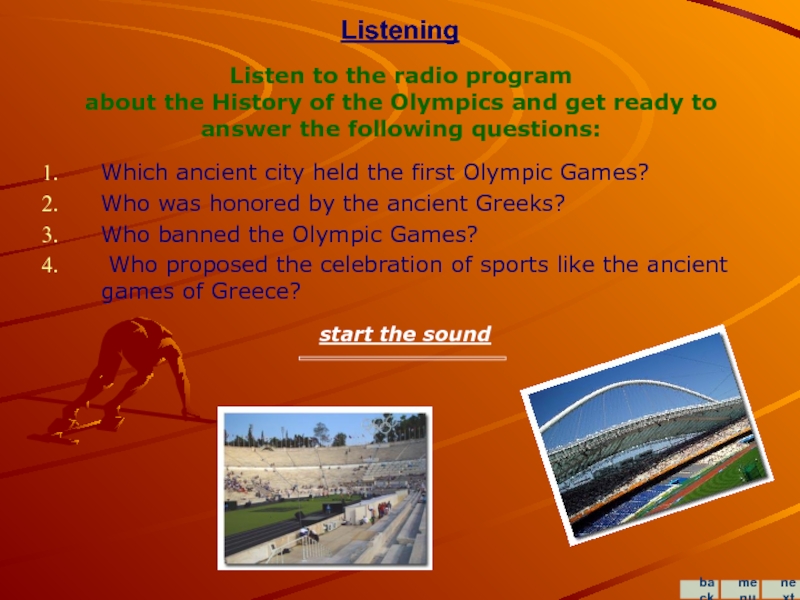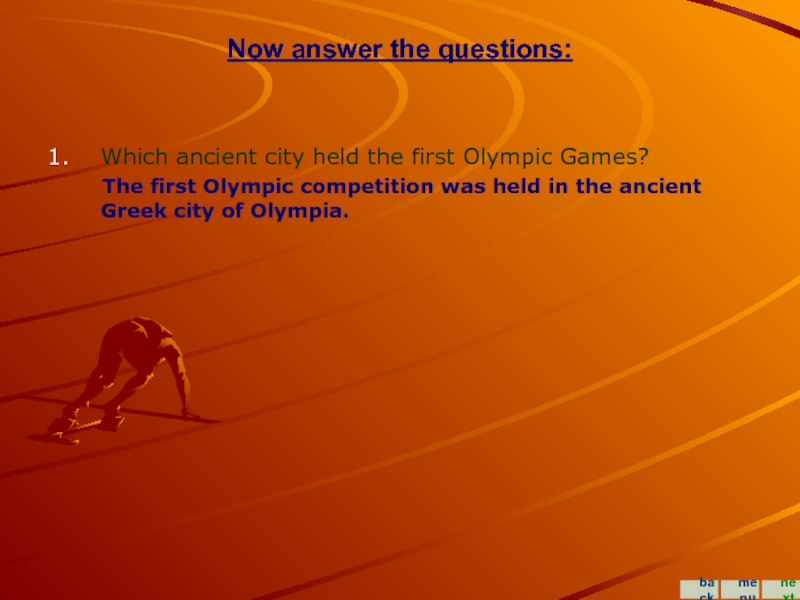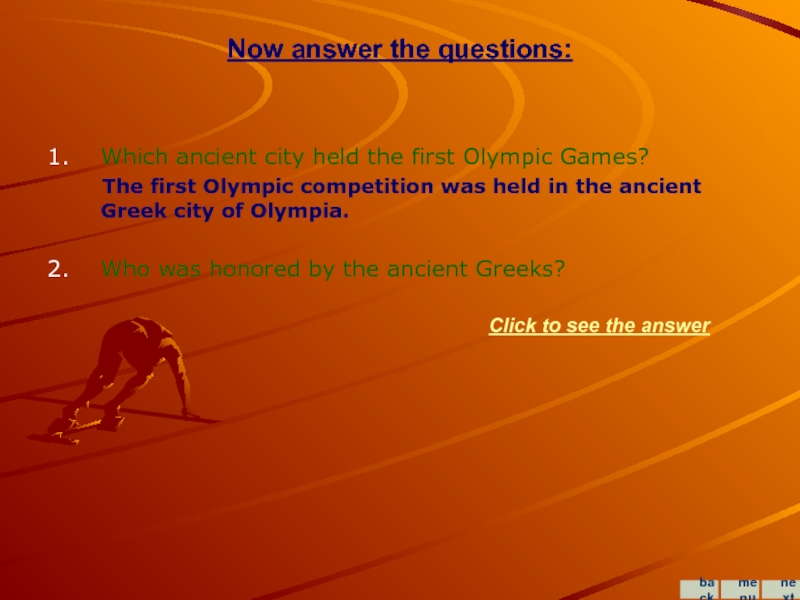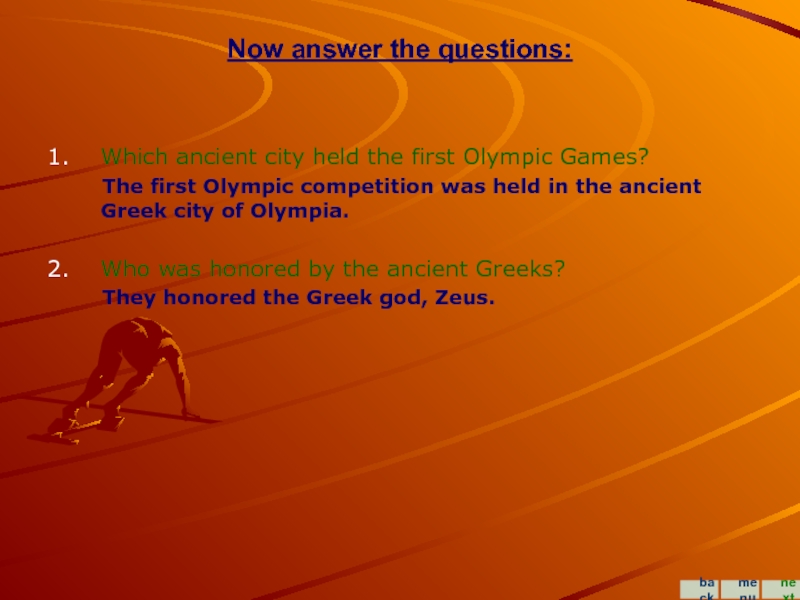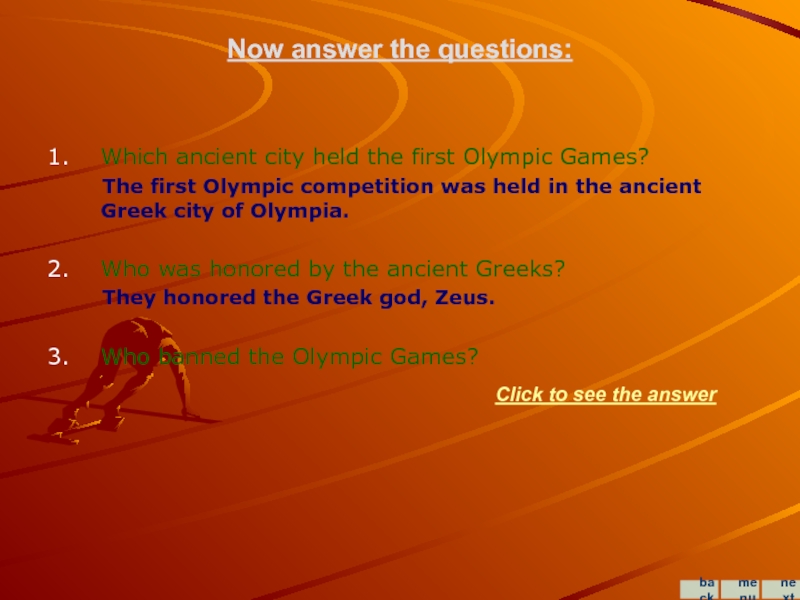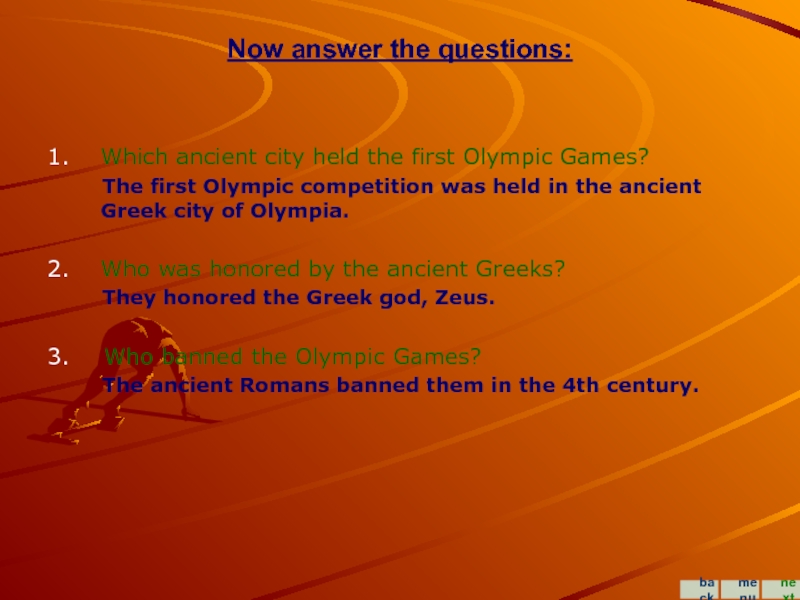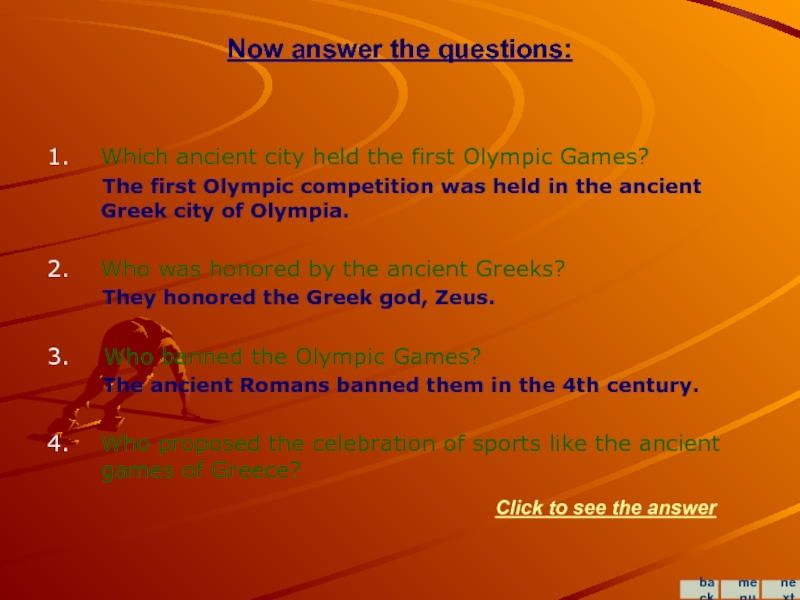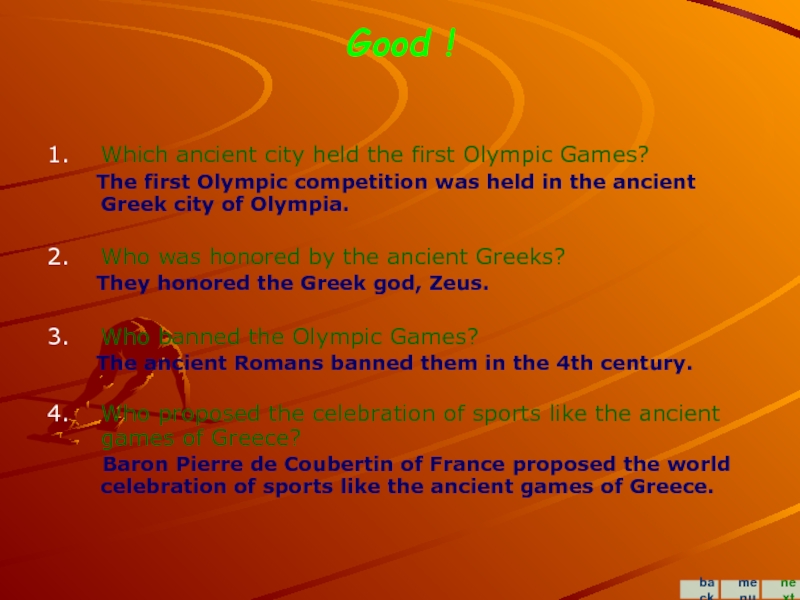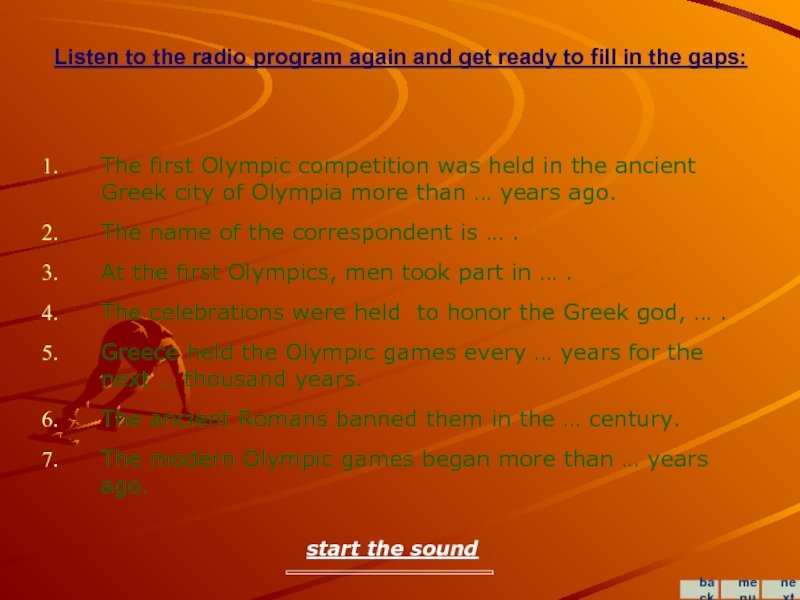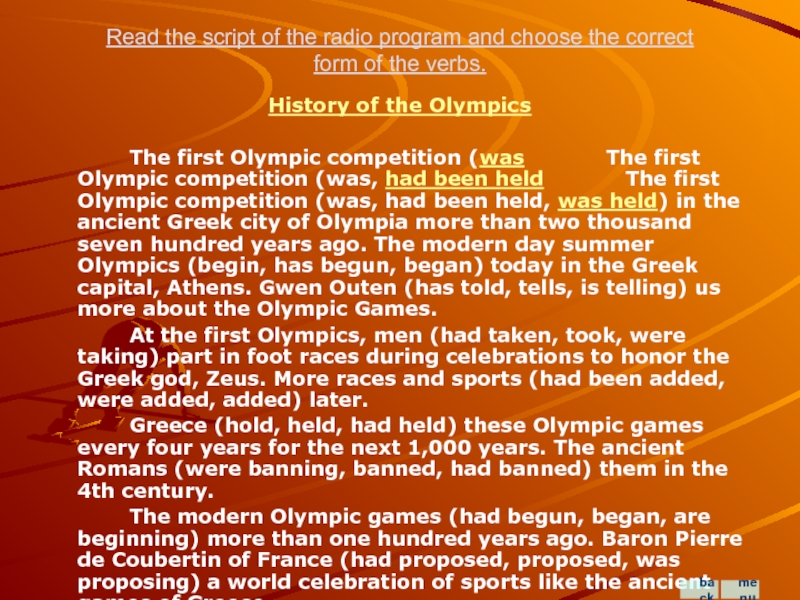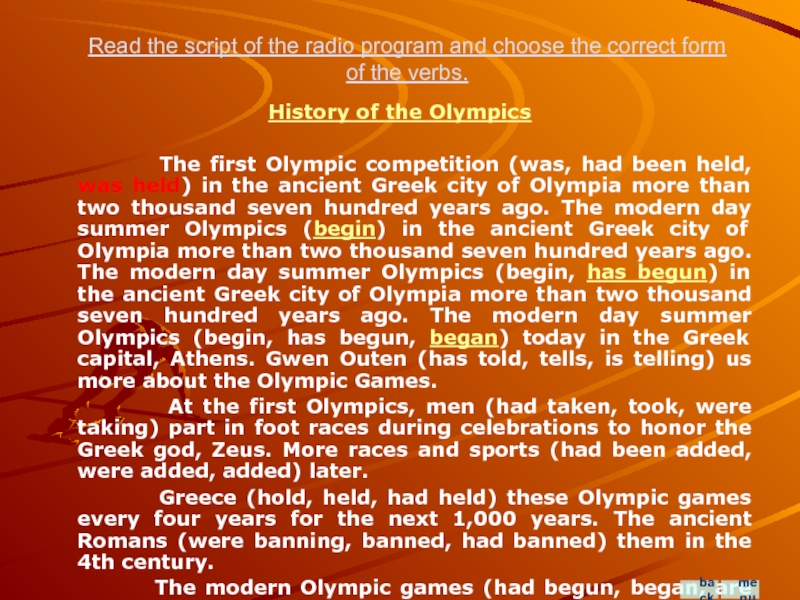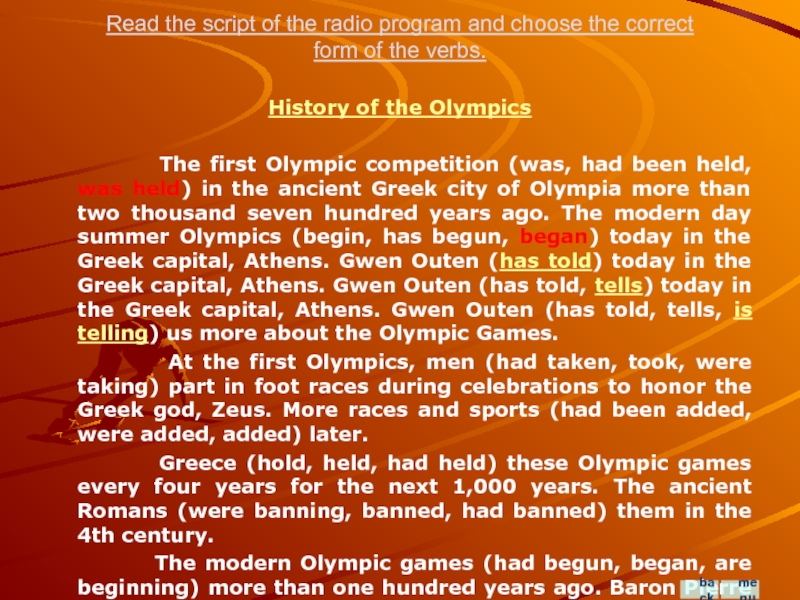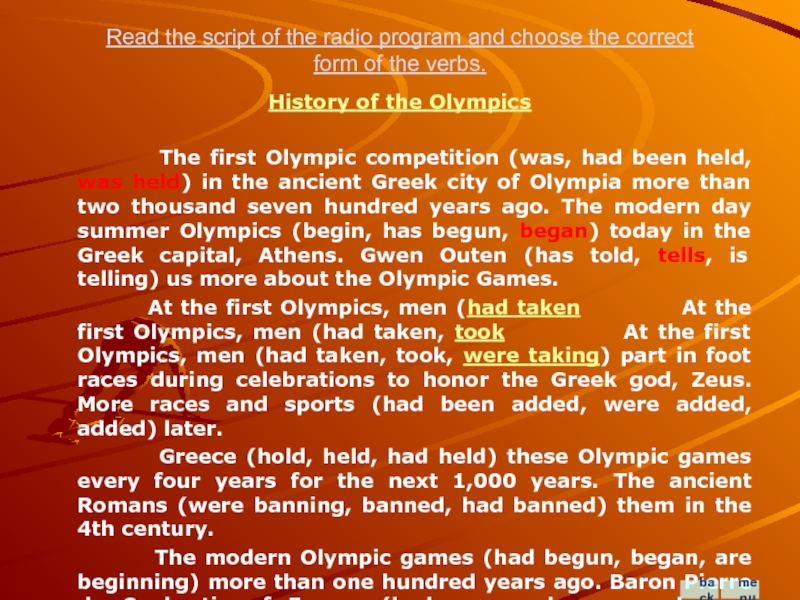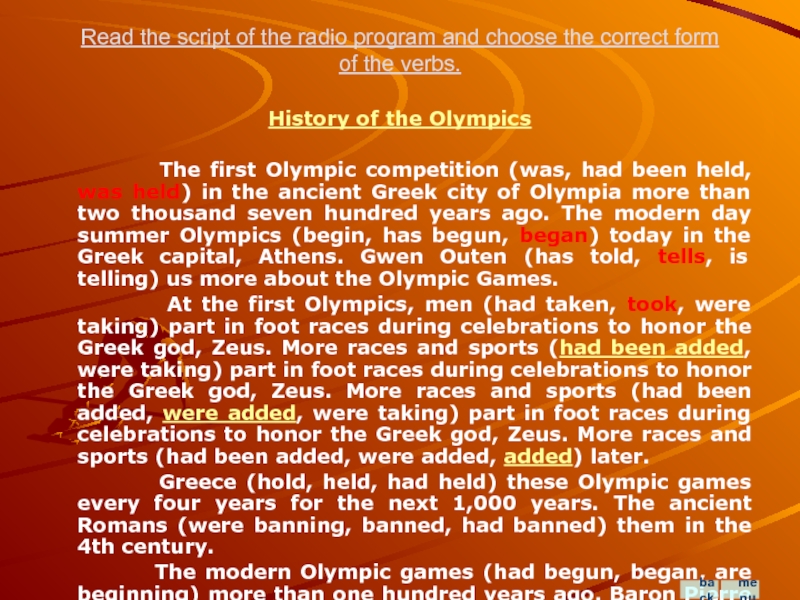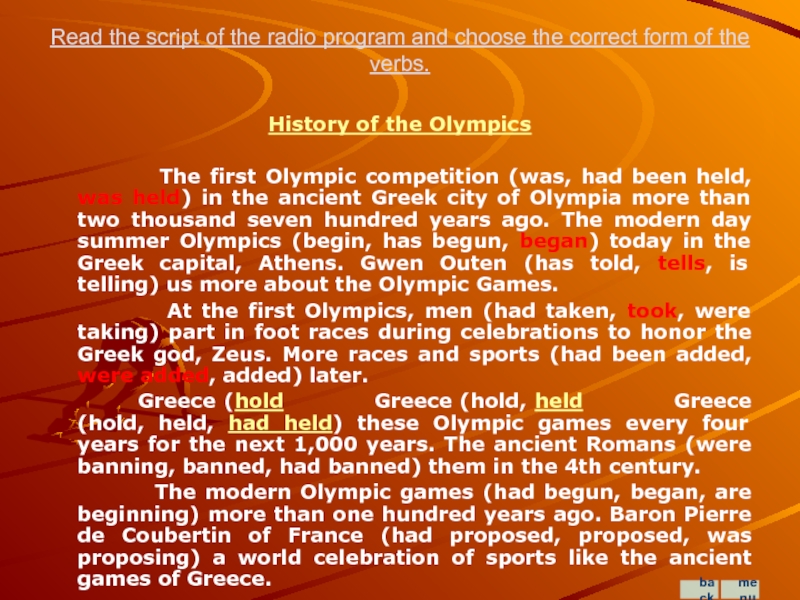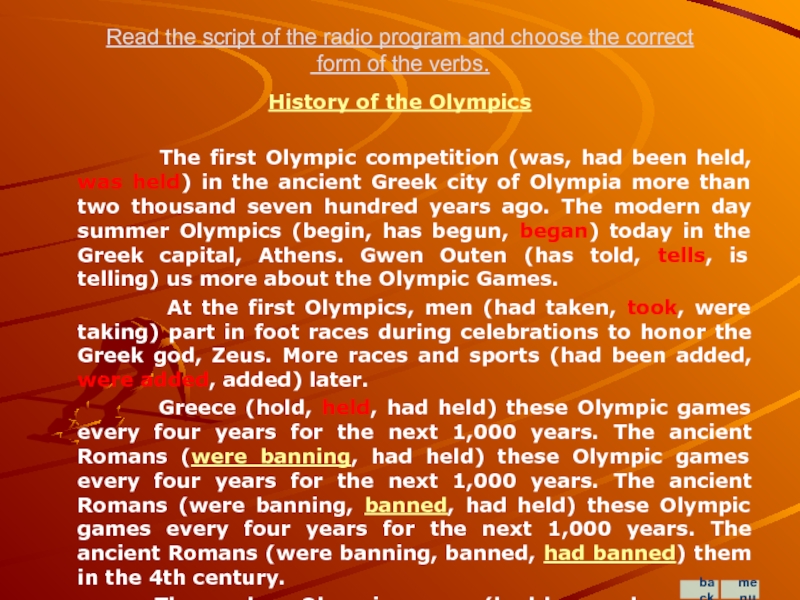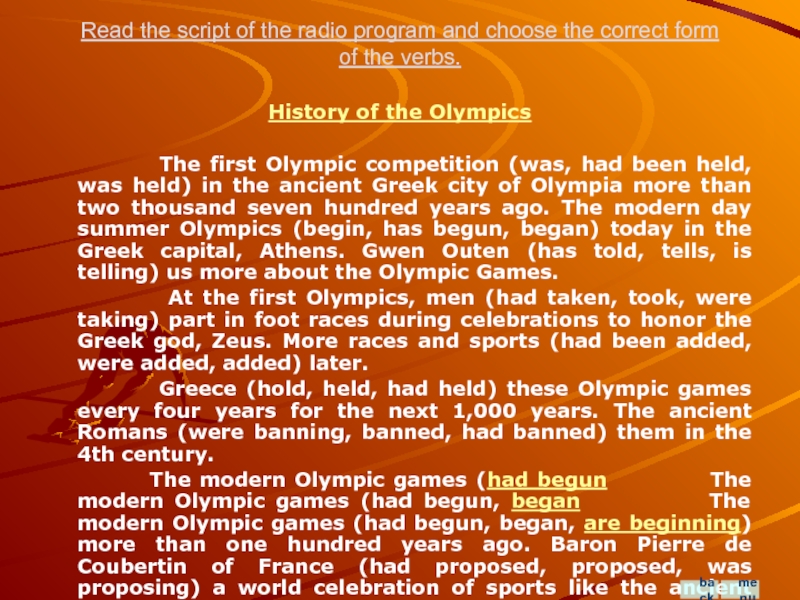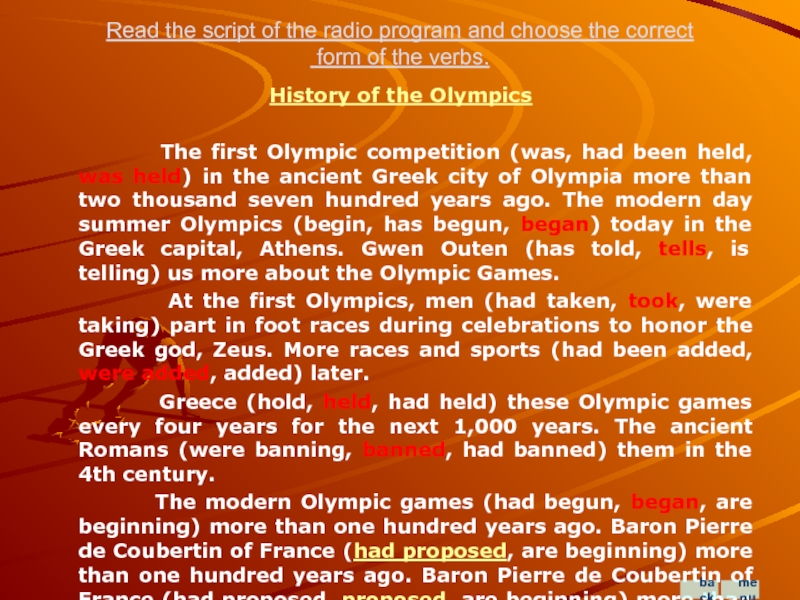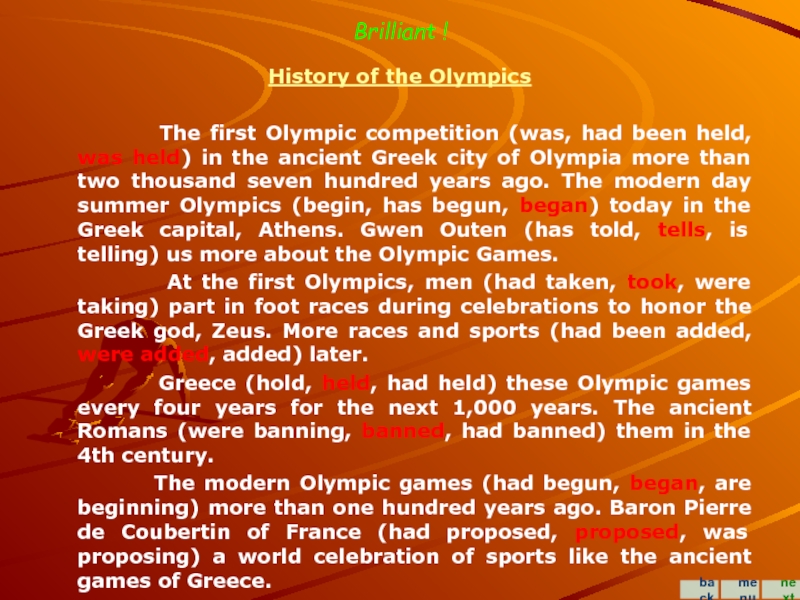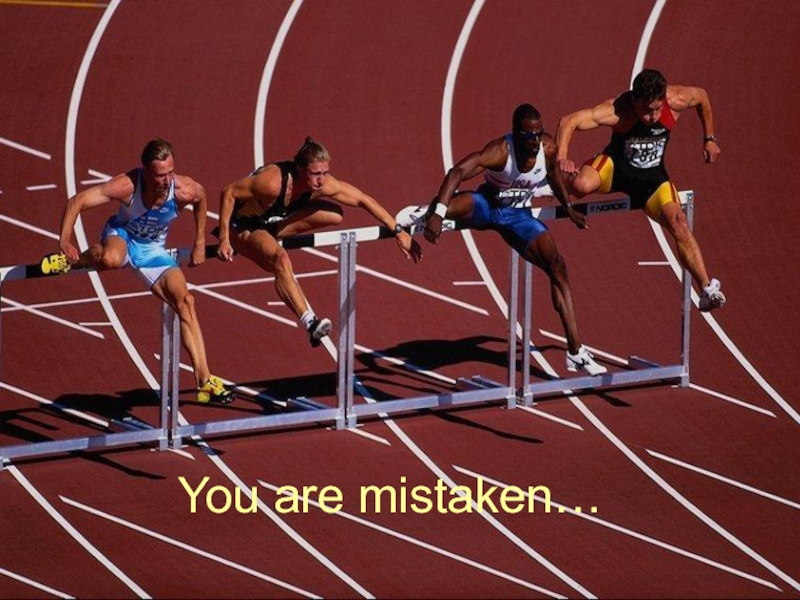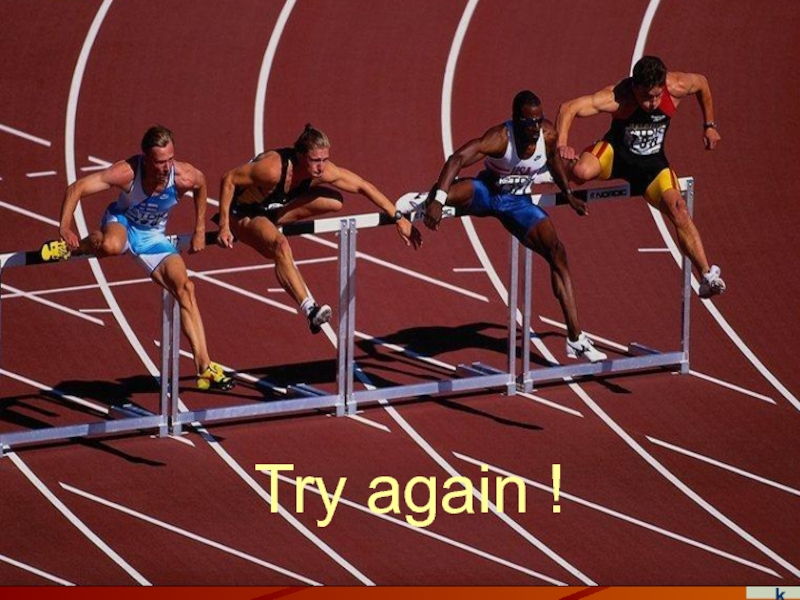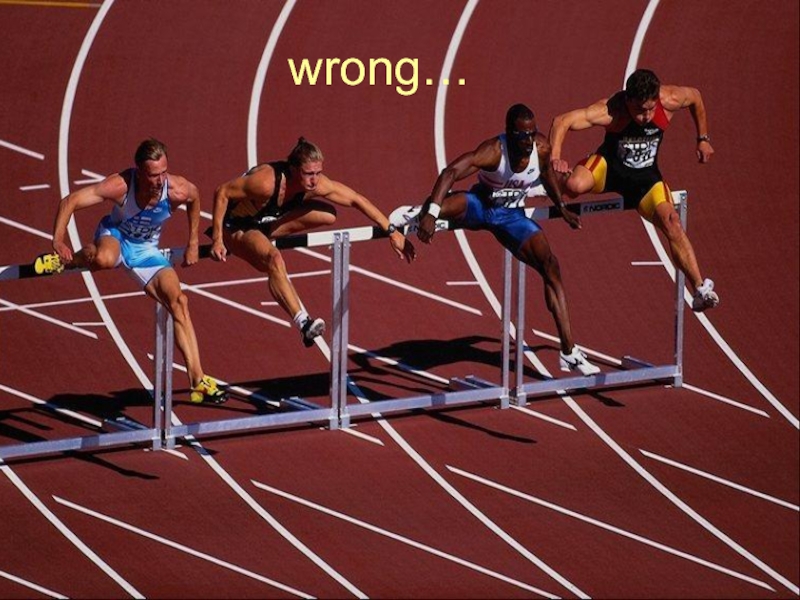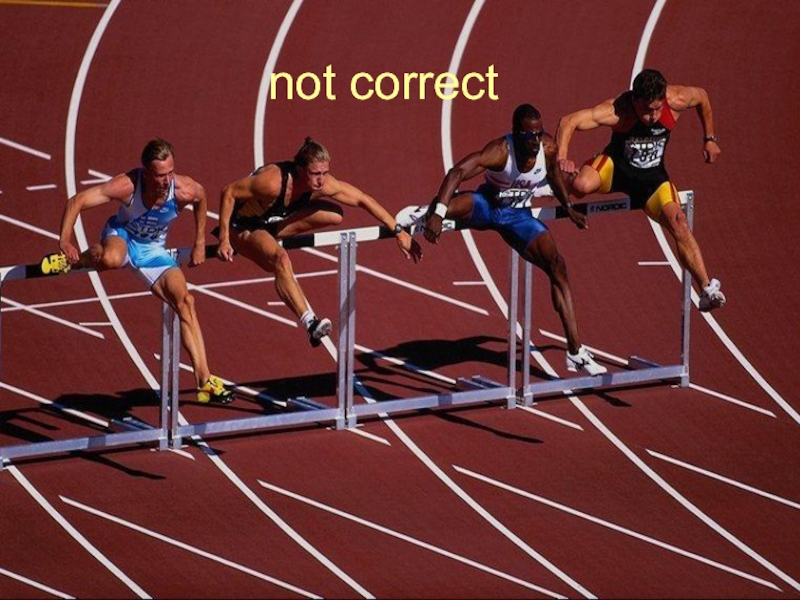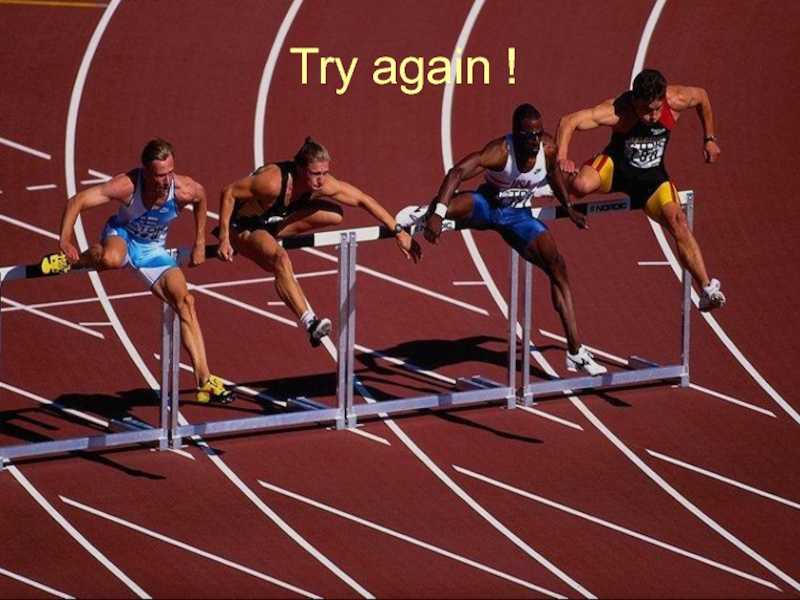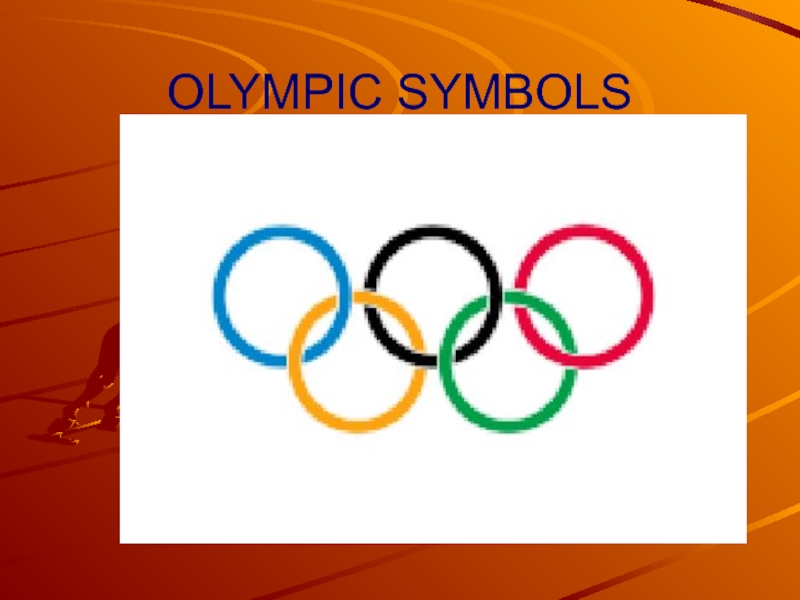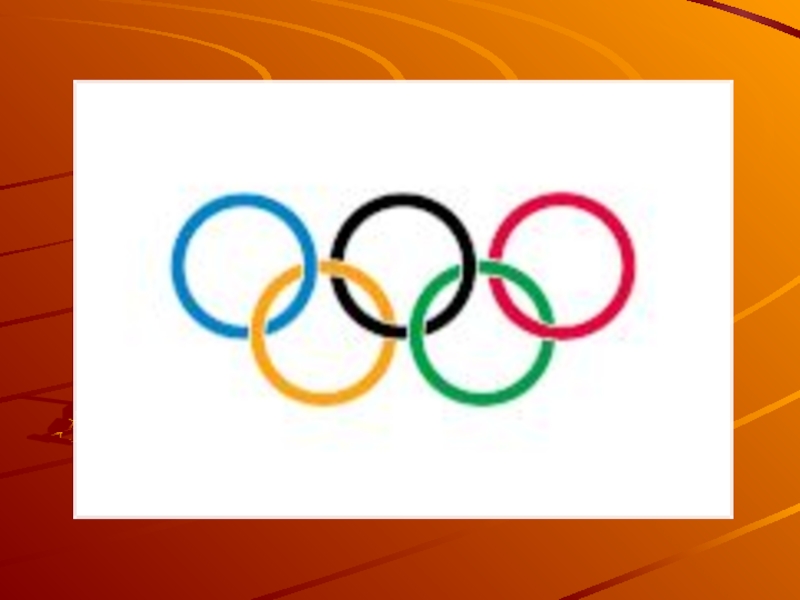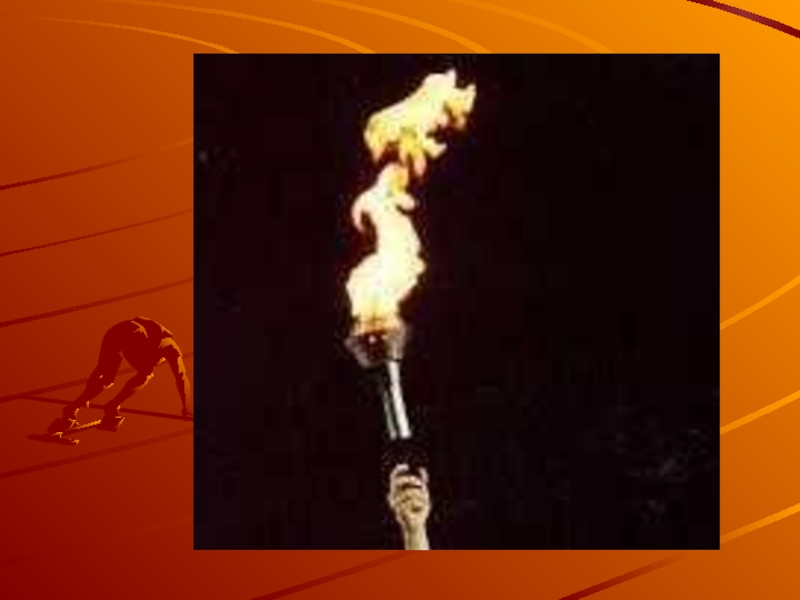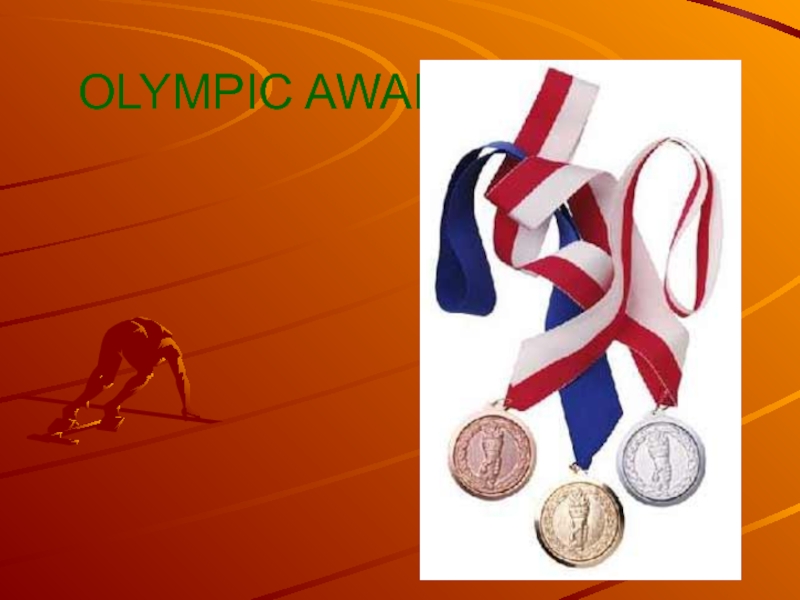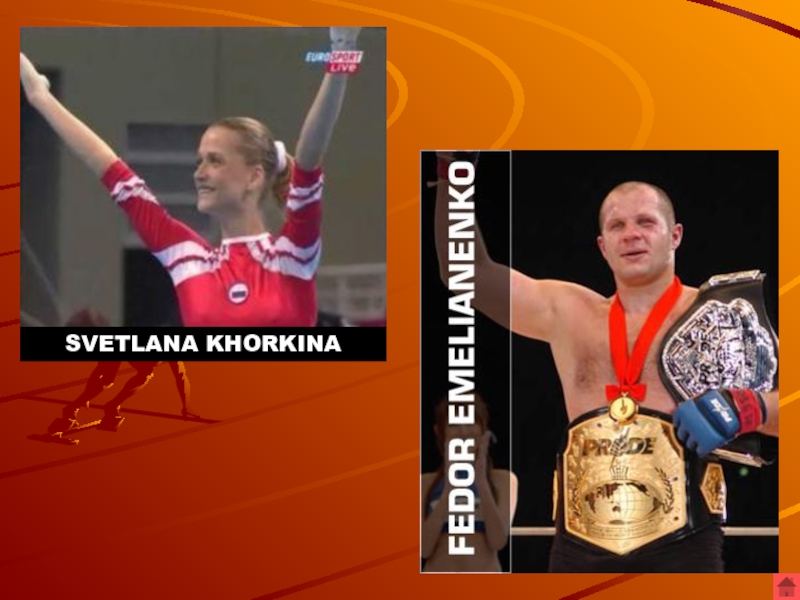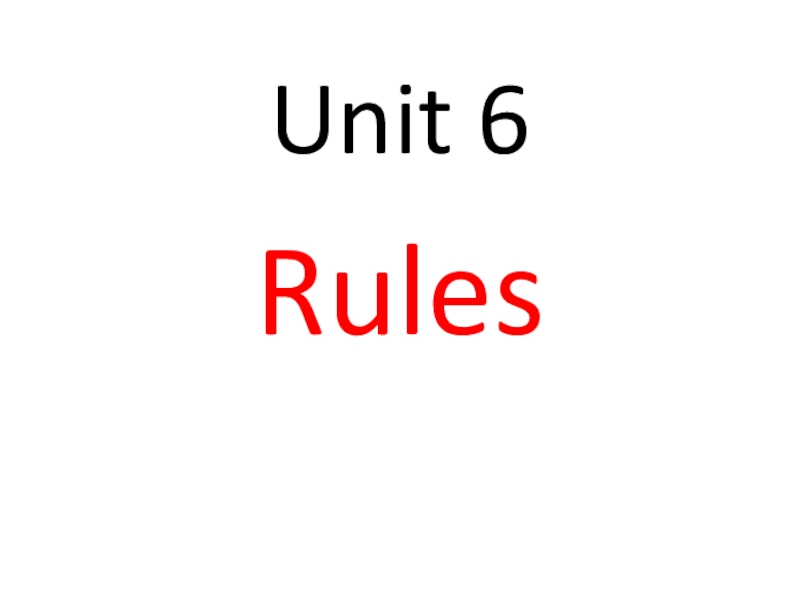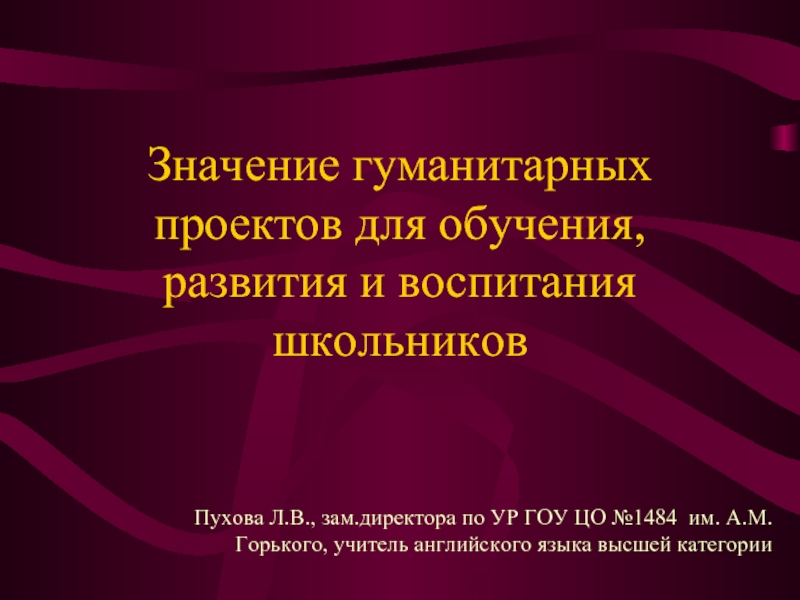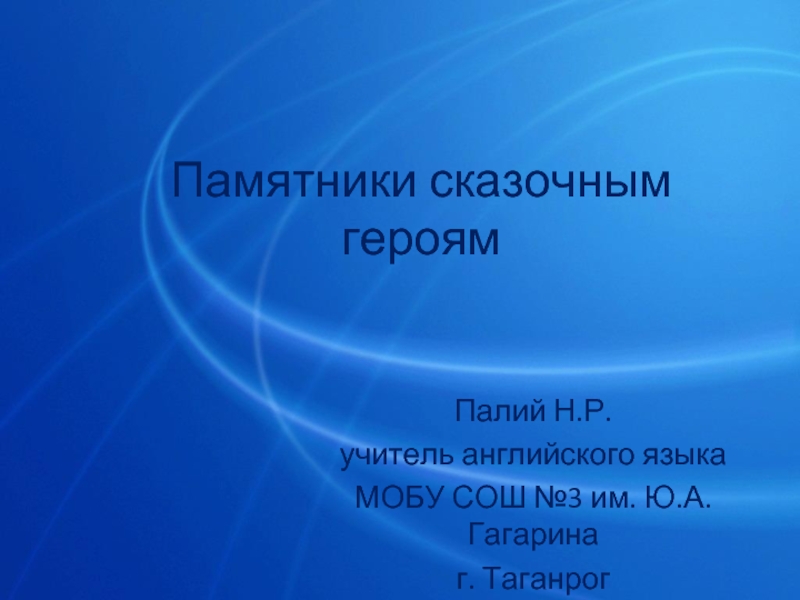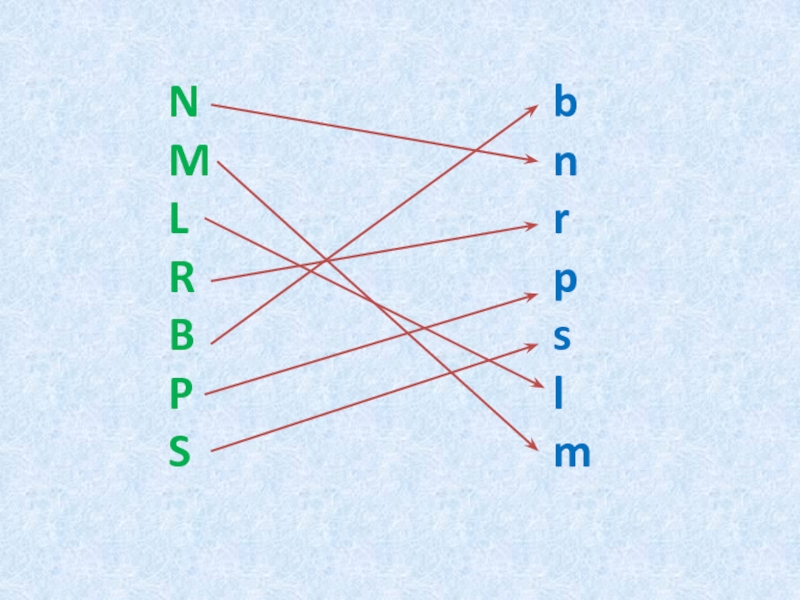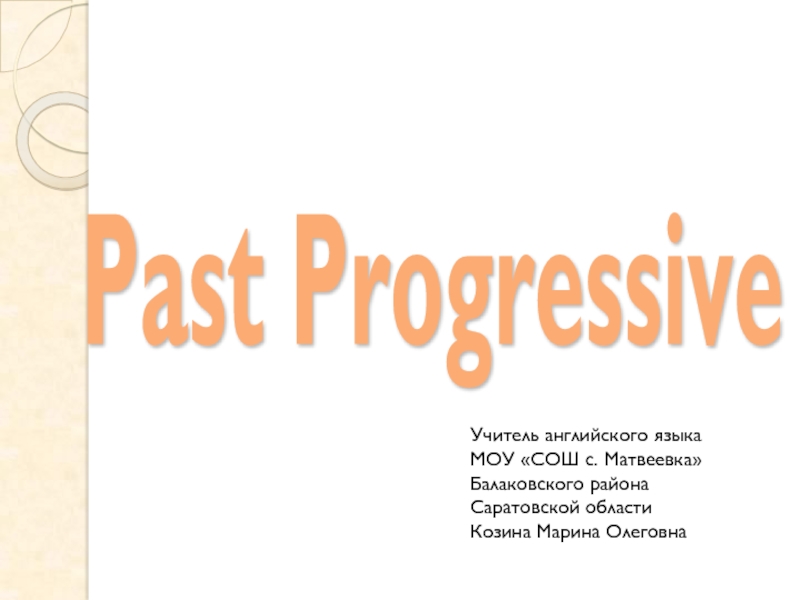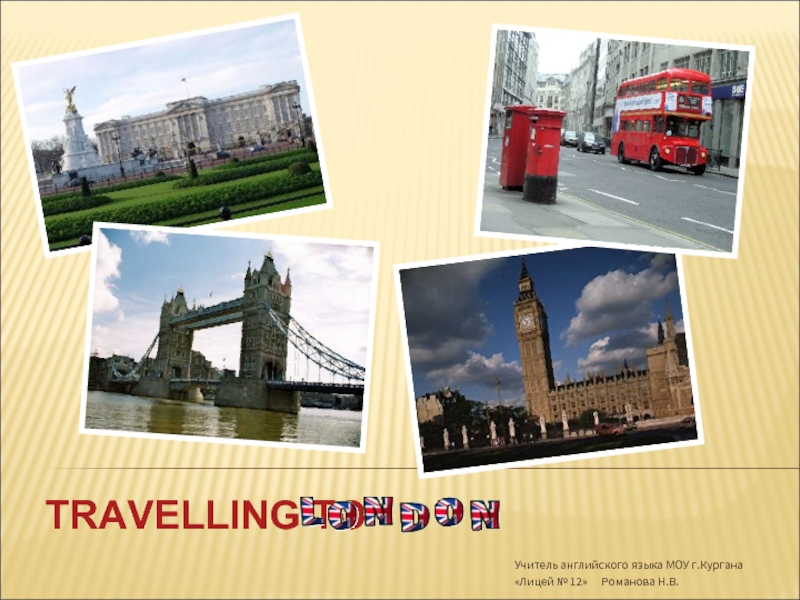Разделы презентаций
- Разное
- Английский язык
- Астрономия
- Алгебра
- Биология
- География
- Геометрия
- Детские презентации
- Информатика
- История
- Литература
- Математика
- Медицина
- Менеджмент
- Музыка
- МХК
- Немецкий язык
- ОБЖ
- Обществознание
- Окружающий мир
- Педагогика
- Русский язык
- Технология
- Физика
- Философия
- Химия
- Шаблоны, картинки для презентаций
- Экология
- Экономика
- Юриспруденция
Presentation on Sports
Содержание
- 1. Presentation on Sports
- 2. Health is above wealth.A healthy mind in a healthy body.
- 3. Why do people go in for sport?It makes …It gives …It helps …
- 4. LISTENING COMPREHENSIONHistory of the Olympics start
- 5. History of the OlympicsVocabulary Work
- 6. Find the Russian equivalentзапрещать
- 7. Find the Russian equivalentзапрещать
- 8. Find the Russian equivalentзапрещатьбыстрее
- 9. Find the Russian equivalentзапрещатьбыстрее
- 10. Find the Russian equivalentзапрещатьбыстрее
- 11. Find the Russian equivalentзапрещать
- 12. Find the Russian equivalentзапрещать
- 13. Find the Russian equivalentзапрещать
- 14. Find the Russian equivalentзапрещать
- 15. Find the Russian equivalentзапрещать
- 16. Find the Russian equivalentзапрещать
- 17. Find the Russian equivalentзапрещать
- 18. Find the Russian equivalentзапрещать
- 19. Wonderful !запрещать
- 20. Choose the correct variant (click on the
- 21. Choose the correct variant (click on the
- 22. Choose the correct variant (click on the
- 23. Choose the correct variant (click on the
- 24. Choose the correct variant (click on the
- 25. Choose the correct variant (click on the
- 26. Choose the correct variant (click on the
- 27. Choose the correct variant (click on the
- 28. Choose the correct variant (click on the
- 29. Choose the correct variant (click on the
- 30. Choose the correct variant (click on the
- 31. Choose the correct variant (click on the
- 32. ListeningWhich ancient city held the first Olympic
- 33. Now answer the questions:1. Which ancient
- 34. Now answer the questions:1. Which ancient
- 35. Now answer the questions:1. Which ancient
- 36. Now answer the questions:1. Which ancient
- 37. Now answer the questions:1. Which ancient
- 38. Now answer the questions:1. Which ancient
- 39. Now answer the questions:1. Which ancient
- 40. Good !1. Which ancient city held
- 41. Listen to the radio program again and
- 42. Read the script of the radio program
- 43. Read the script of the radio program
- 44. Read the script of the radio program
- 45. Read the script of the radio program
- 46. Read the script of the radio program
- 47. Read the script of the radio program
- 48. Read the script of the radio program
- 49. Read the script of the radio program
- 50. Read the script of the radio program
- 51. Brilliant ! History of the Olympics
- 52. backYou are mistaken…
- 53. backTry again !
- 54. backwrong…
- 55. backnot correct
- 56. backTry again !
- 57. OLYMPIC SYMBOLS
- 58. Слайд 58
- 59. Слайд 59
- 60. CITIUS – ALTIUS - FORTIUS
- 61. OLYMPIC AWARDS
- 62. SVETLANA KHORKINA
- 63. Скачать презентанцию
Слайды и текст этой презентации
Слайд 6Find the Russian equivalent
запрещать
быстрее
принимать участие
соревноваться в
представлять
проводиться
атлет
бег
спортивное событие
Олимпийские игры
предложить
соединённые кольца
чтить, почитать
an athletic event
-
-
-
-
-
-
-
-
-
-
-
-
-
menu
back
Слайд 7Find the Russian equivalent
запрещать
быстрее
принимать участие
соревноваться в
представлять
проводиться
атлет
бег
спортивное событие
Олимпийские игры
предложить
соединённые кольца
чтить, почитать
an athlete
-
-
-
-
-
-
-
-
-
-
-
-
-
an athletic event
menu
back
Слайд 8Find the Russian equivalent
запрещать
быстрее
принимать участие
соревноваться в
представлять
проводиться
атлет
бег
спортивное
событиеОлимпийские игры
предложить
соединённые кольца
чтить, почитать
a foot race
-
-
-
-
-
-
-
-
-
-
-
-
-
an athlete
an athletic event
menu
back
Слайд 9Find the Russian equivalent
запрещать
быстрее
принимать участие
соревноваться в
представлять
проводиться
атлет
бег
спортивное
событиеОлимпийские игры
предложить
соединённые кольца
чтить, почитать
to honor
-
-
-
-
-
-
-
-
-
-
-
-
-
an athlete
a foot race
an athletic event
menu
back
Слайд 10Find the Russian equivalent
запрещать
быстрее
принимать участие
соревноваться в
представлять
проводиться
атлет
бег
спортивное
событиеОлимпийские игры
предложить
соединённые кольца
чтить, почитать
to ban
-
-
-
-
-
-
-
-
-
-
-
-
-
an athlete
a foot race
an athletic event
to honor
menu
back
Слайд 11Find the Russian equivalent
запрещать
быстрее
принимать участие
соревноваться в
представлять
проводиться
атлет
бег
спортивное событие
Олимпийские игры
предложить
соединённые кольца
чтить, почитать
to compete in
-
-
-
-
-
-
-
-
-
-
-
-
-
to ban
an athlete
a foot race
an athletic event
to honor
menu
back
Слайд 12Find the Russian equivalent
запрещать
быстрее
принимать участие
соревноваться в
представлять
проводиться
атлет
бег
спортивное событие
Олимпийские игры
предложить
сосоединёнсоединённые кольца
чтить, почитать
linked rings
-
-
-
-
-
-
-
-
-
-
-
-
-
to ban
to compete in
an athlete
a foot race
an athletic event
to honor
menu
back
Слайд 13Find the Russian equivalent
запрещать
быстрее
принимать участие
соревноваться в
представлять
проводиться
атлет
бег
спортивное событие
Олимпийские игры
предложить
соединённые кольца
чтить, почитать
to represent
-
-
-
-
-
-
-
-
-
-
-
-
-
to ban
to compete in
an athlete
a foot race
an athletic event
linked rings
to honor
menu
back
Слайд 14Find the Russian equivalent
запрещать
быстрее
принимать участие
соревноваться в
представлять
проводиться
атлет
бег
спортивное событие
Олимпийские игры
предложить
соединённые
кольцачтить, почитать
swifter
-
-
-
-
-
-
-
-
-
-
-
-
-
to ban
to compete in
to represent
an athlete
a foot race
an athletic event
linked rings
to honor
menu
back
Слайд 15Find the Russian equivalent
запрещать
быстрее
принимать участие
соревноваться в
представлять
провопроводиться
атлет
бег
спортивное событие
Олимпийские игры
предложить
соединённые кольца
чтить, почитать
to be held
-
-
-
-
-
-
-
-
-
-
-
-
-
to ban
swifter
to compete in
to represent
an athlete
a foot race
an athletic event
linked rings
to honor
menu
back
Слайд 16Find the Russian equivalent
запрещать
быстрее
прприпринимать участие
соревноваться в
представлять
проводиться
атлет
бег
спортивное событие
Олимпийские игры
предложить
соединённые кольца
чтить, почитать
to take part
-
-
-
-
-
-
-
-
-
-
-
-
-
to ban
swifter
to compete in
to represent
to be held
an athlete
a foot race
an athletic event
linked rings
to honor
menu
back
Слайд 17Find the Russian equivalent
запрещать
быстрее
принимать участие
соревноваться в
представлять
проводиться
атлет
бег
спортивное событие
Олимпийские игры
предложить
соединённые кольца
чтить, почитать
Olympic competition
-
-
-
-
-
-
-
-
-
-
-
-
-
to ban
swifter
to take part
to compete in
to represent
to be held
an athlete
a foot race
an athletic event
linked rings
to honor
menu
back
Слайд 18Find the Russian equivalent
запрещать
быстрее
принимать участие
соревноваться в
представлять
проводиться
атлет
бег
спортивное событие
Олимпийские игры
предложить
соединённые кольца
чтить, почитать
to propose
-
-
-
-
-
-
-
-
-
-
-
-
-
to ban
swifter
to take part
to compete in
to represent
to be held
an athlete
a foot race
an athletic event
Olympic competition
linked rings
to honor
menu
back
Слайд 19Wonderful !
запрещать
быстрее
принимать участие
соревноваться в
представлять
проводиться
атлет
бег
спортивное событие
Олимпийские игры
предложить
соединённые кольца
чтить, почитать
-
-
-
-
-
-
-
-
-
-
-
-
-
to ban
swifter
to take part
to compete in
to represent
to be held
an athlete
a foot race
an athletic event
Olympic competition
to propose
linked rings
to honor
menu
next
back
Слайд 20Choose the correct variant (click on the most suitable word or
phrase to fill in the gap)
were spentwere spent
was
completedwas completed were playedwere played
were heldwere held
The Games … every four years in summer.
menu
back
Слайд 21Choose the correct variant (click on the most suitable word or
phrase to fill in the gap)
were spent
was completed
were played
were held
The Games were held every four years in summer.
menu
next
back
Слайд 22Choose the correct variant (click on the most suitable word or
phrase to fill in the gap)
the Zeus’s Gamesthe Zeus’s
Games the Olympic competitionthe Olympic competition
the Victory Gamesthe Victory Games
The games organized in Olympia were called ….
menu
back
Слайд 23Choose the correct variant (click on the most suitable word or
phrase to fill in the gap)
the Zeus’s Games
the
Olympic competition the Victory Games
The games organized in Olympia were called
the Olympic competition.
menu
next
back
Слайд 24Choose the correct variant (click on the most suitable word or
phrase to fill in the gap)
“Wiser, Stronger, Slimmer”
“Swifter,
Smarter, Taller” “Swifter, Higher, Stronger”
The Olympic saying is “………”.
menu
back
Слайд 25Choose the correct variant (click on the most suitable word or
phrase to fill in the gap)
“Wiser, Stronger, Slimmer”
“Swifter,
Smarter, Taller” “Swifter, Higher, Stronger”
The Olympic saying is “Swifter, Higher, Stronger.”
menu
next
back
Слайд 26Choose the correct variant (click on the most suitable word or
phrase to fill in the gap)
hatedhated
liked
honored
amusedamused
Ancient Greeks … their gods.
menu
back
Слайд 27Choose the correct variant (click on the most suitable word or
phrase to fill in the gap)
hated
liked
honored
amused
Ancient Greeks honored their gods.
menu
next
back
Слайд 28Choose the correct variant (click on the most suitable word or
phrase to fill in the gap)
had to
were invited
were not
allowedwere not allowed didn’t want
Women … to take part in the Olympic Games.
menu
back
Слайд 29Choose the correct variant (click on the most suitable word or
phrase to fill in the gap)
had to
were invited
were
not allowed didn’t want
Women were not allowed to take part in the
Olympic Games.
menu
next
back
Слайд 30Choose the correct variant (click on the most suitable word or
phrase to fill in the gap)
linked ringslinked rings
a
bearNike
a dove of peace
The contemporary symbol of the
Olympic Games is ….
menu
back
Слайд 31Choose the correct variant (click on the most suitable word or
phrase to fill in the gap)
linked rings
a bear
Nike
a dove of peace
The contemporary symbol of the
Olympic Games is linked rings.
menu
next
back
Слайд 32Listening
Which ancient city held the first Olympic Games?
Who was
honored by the ancient Greeks?
Who banned the Olympic Games?
Who proposed the celebration of sports like the ancient games of Greece?Listen to the radio program
about the History of the Olympics and get ready to answer the following questions:
start the sound
menu
next
back
Слайд 33Now answer the questions:
1. Which ancient city held the
first Olympic Games?
Click to see the answer
menu
next
back
Слайд 34Now answer the questions:
1. Which ancient city held the
first Olympic Games?
The first Olympic competition
was held in the ancient Greek city of Olympia.menu
next
back
Слайд 35Now answer the questions:
1. Which ancient city held the
first Olympic Games?
The first Olympic competition
was held in the ancient Greek city of Olympia.2. Who was honored by the ancient Greeks?
Click to see the answer
menu
next
back
Слайд 36Now answer the questions:
1. Which ancient city held the
first Olympic Games?
The first Olympic competition
was held in the ancient Greek city of Olympia.2. Who was honored by the ancient Greeks?
They honored the Greek god, Zeus.
menu
next
back
Слайд 37Now answer the questions:
1. Which ancient city held the
first Olympic Games?
The first Olympic competition
was held in the ancient Greek city of Olympia.2. Who was honored by the ancient Greeks?
They honored the Greek god, Zeus.
3. Who banned the Olympic Games?
Click to see the answer
menu
next
back
Слайд 38Now answer the questions:
1. Which ancient city held the
first Olympic Games?
The first Olympic competition
was held in the ancient Greek city of Olympia.2. Who was honored by the ancient Greeks?
They honored the Greek god, Zeus.
3. Who banned the Olympic Games?
The ancient Romans banned them in the 4th century.
menu
next
back
Слайд 39Now answer the questions:
1. Which ancient city held the
first Olympic Games?
The first Olympic competition
was held in the ancient Greek city of Olympia.2. Who was honored by the ancient Greeks?
They honored the Greek god, Zeus.
3. Who banned the Olympic Games?
The ancient Romans banned them in the 4th century.
4. Who proposed the celebration of sports like the ancient games of Greece?
Click to see the answer
menu
next
back
Слайд 40Good !
1. Which ancient city held the first Olympic
Games?
The first Olympic competition was held
in the ancient Greek city of Olympia.2. Who was honored by the ancient Greeks?
They honored the Greek god, Zeus.
3. Who banned the Olympic Games?
The ancient Romans banned them in the 4th century.
4. Who proposed the celebration of sports like the ancient games of Greece?
Baron Pierre de Coubertin of France proposed the world celebration of sports like the ancient games of Greece.
menu
next
back
Слайд 41Listen to the radio program again and get ready to
fill in the gaps:
The first Olympic competition was held in
the ancient Greek city of Olympia more than … years ago.The name of the correspondent is … .
At the first Olympics, men took part in … .
The celebrations were held to honor the Greek god, … .
Greece held the Olympic games every … years for the next … thousand years.
The ancient Romans banned them in the … century.
The modern Olympic games began more than … years ago.
start the sound
menu
next
back
Слайд 42Read the script of the radio program and choose the
correct
form of the verbs.
History of the Olympics
The first Olympic competition (was The first Olympic competition (was, had been held The first Olympic competition (was, had been held, was held) in the ancient Greek city of Olympia more than two thousand seven hundred years ago. The modern day summer Olympics (begin, has begun, began) today in the Greek capital, Athens. Gwen Outen (has told, tells, is telling) us more about the Olympic Games. At the first Olympics, men (had taken, took, were taking) part in foot races during celebrations to honor the Greek god, Zeus. More races and sports (had been added, were added, added) later.
Greece (hold, held, had held) these Olympic games every four years for the next 1,000 years. The ancient Romans (were banning, banned, had banned) them in the 4th century.
The modern Olympic games (had begun, began, are beginning) more than one hundred years ago. Baron Pierre de Coubertin of France (had proposed, proposed, was proposing) a world celebration of sports like the ancient games of Greece.
menu
back
Слайд 43Read the script of the radio program and choose the
correct form
of the verbs.
History of the Olympics
The first Olympic competition (was, had been held, was held) in the ancient Greek city of Olympia more than two thousand seven hundred years ago. The modern day summer Olympics (begin) in the ancient Greek city of Olympia more than two thousand seven hundred years ago. The modern day summer Olympics (begin, has begun) in the ancient Greek city of Olympia more than two thousand seven hundred years ago. The modern day summer Olympics (begin, has begun, began) today in the Greek capital, Athens. Gwen Outen (has told, tells, is telling) us more about the Olympic Games. At the first Olympics, men (had taken, took, were taking) part in foot races during celebrations to honor the Greek god, Zeus. More races and sports (had been added, were added, added) later.
Greece (hold, held, had held) these Olympic games every four years for the next 1,000 years. The ancient Romans (were banning, banned, had banned) them in the 4th century.
The modern Olympic games (had begun, began, are beginning) more than one hundred years ago. Baron Pierre de Coubertin of France (had proposed, proposed, was proposing) a world celebration of sports like the ancient games of Greece.
menu
back
Слайд 44Read the script of the radio program and choose the
correct
form of the verbs.
History of the Olympics
The first Olympic competition (was, had been held, was held) in the ancient Greek city of Olympia more than two thousand seven hundred years ago. The modern day summer Olympics (begin, has begun, began) today in the Greek capital, Athens. Gwen Outen (has told) today in the Greek capital, Athens. Gwen Outen (has told, tells) today in the Greek capital, Athens. Gwen Outen (has told, tells, is telling) us more about the Olympic Games. At the first Olympics, men (had taken, took, were taking) part in foot races during celebrations to honor the Greek god, Zeus. More races and sports (had been added, were added, added) later.
Greece (hold, held, had held) these Olympic games every four years for the next 1,000 years. The ancient Romans (were banning, banned, had banned) them in the 4th century.
The modern Olympic games (had begun, began, are beginning) more than one hundred years ago. Baron Pierre de Coubertin of France (had proposed, proposed, was proposing) a world celebration of sports like the ancient games of Greece.
menu
back
Слайд 45Read the script of the radio program and choose the
correct
form of the verbs.
History of the Olympics
The first Olympic competition (was, had been held, was held) in the ancient Greek city of Olympia more than two thousand seven hundred years ago. The modern day summer Olympics (begin, has begun, began) today in the Greek capital, Athens. Gwen Outen (has told, tells, is telling) us more about the Olympic Games. At the first Olympics, men (had taken At the first Olympics, men (had taken, took At the first Olympics, men (had taken, took, were taking) part in foot races during celebrations to honor the Greek god, Zeus. More races and sports (had been added, were added, added) later.
Greece (hold, held, had held) these Olympic games every four years for the next 1,000 years. The ancient Romans (were banning, banned, had banned) them in the 4th century.
The modern Olympic games (had begun, began, are beginning) more than one hundred years ago. Baron Pierre de Coubertin of France (had proposed, proposed, was proposing) a world celebration of sports like the ancient games of Greece.
menu
back
Слайд 46Read the script of the radio program and choose the
correct form
of the verbs.
History of the Olympics
The first Olympic competition (was, had been held, was held) in the ancient Greek city of Olympia more than two thousand seven hundred years ago. The modern day summer Olympics (begin, has begun, began) today in the Greek capital, Athens. Gwen Outen (has told, tells, is telling) us more about the Olympic Games. At the first Olympics, men (had taken, took, were taking) part in foot races during celebrations to honor the Greek god, Zeus. More races and sports (had been added, were taking) part in foot races during celebrations to honor the Greek god, Zeus. More races and sports (had been added, were added, were taking) part in foot races during celebrations to honor the Greek god, Zeus. More races and sports (had been added, were added, added) later.
Greece (hold, held, had held) these Olympic games every four years for the next 1,000 years. The ancient Romans (were banning, banned, had banned) them in the 4th century.
The modern Olympic games (had begun, began, are beginning) more than one hundred years ago. Baron Pierre de Coubertin of France (had proposed, proposed, was proposing) a world celebration of sports like the ancient games of Greece.
menu
back
Слайд 47Read the script of the radio program and choose the
correct form of the verbs.
History of the Olympics
The first Olympic competition (was, had been held, was held) in the ancient Greek city of Olympia more than two thousand seven hundred years ago. The modern day summer Olympics (begin, has begun, began) today in the Greek capital, Athens. Gwen Outen (has told, tells, is telling) us more about the Olympic Games. At the first Olympics, men (had taken, took, were taking) part in foot races during celebrations to honor the Greek god, Zeus. More races and sports (had been added, were added, added) later.
Greece (hold Greece (hold, held Greece (hold, held, had held) these Olympic games every four years for the next 1,000 years. The ancient Romans (were banning, banned, had banned) them in the 4th century.
The modern Olympic games (had begun, began, are beginning) more than one hundred years ago. Baron Pierre de Coubertin of France (had proposed, proposed, was proposing) a world celebration of sports like the ancient games of Greece.
menu
back
Слайд 48Read the script of the radio program and choose the
correct
form of the verbs.
History of the Olympics
The first Olympic competition (was, had been held, was held) in the ancient Greek city of Olympia more than two thousand seven hundred years ago. The modern day summer Olympics (begin, has begun, began) today in the Greek capital, Athens. Gwen Outen (has told, tells, is telling) us more about the Olympic Games. At the first Olympics, men (had taken, took, were taking) part in foot races during celebrations to honor the Greek god, Zeus. More races and sports (had been added, were added, added) later.
Greece (hold, held, had held) these Olympic games every four years for the next 1,000 years. The ancient Romans (were banning, had held) these Olympic games every four years for the next 1,000 years. The ancient Romans (were banning, banned, had held) these Olympic games every four years for the next 1,000 years. The ancient Romans (were banning, banned, had banned) them in the 4th century.
The modern Olympic games (had begun, began, are beginning) more than one hundred years ago. Baron Pierre de Coubertin of France (had proposed, proposed, was proposing) a world celebration of sports like the ancient games of Greece.
menu
back
Слайд 49Read the script of the radio program and choose the
correct form
of the verbs.
History of the Olympics
The first Olympic competition (was, had been held, was held) in the ancient Greek city of Olympia more than two thousand seven hundred years ago. The modern day summer Olympics (begin, has begun, began) today in the Greek capital, Athens. Gwen Outen (has told, tells, is telling) us more about the Olympic Games. At the first Olympics, men (had taken, took, were taking) part in foot races during celebrations to honor the Greek god, Zeus. More races and sports (had been added, were added, added) later.
Greece (hold, held, had held) these Olympic games every four years for the next 1,000 years. The ancient Romans (were banning, banned, had banned) them in the 4th century.
The modern Olympic games (had begun The modern Olympic games (had begun, began The modern Olympic games (had begun, began, are beginning) more than one hundred years ago. Baron Pierre de Coubertin of France (had proposed, proposed, was proposing) a world celebration of sports like the ancient games of Greece.
menu
back
Слайд 50Read the script of the radio program and choose the
correct
form of the verbs.
History of the Olympics
The first Olympic competition (was, had been held, was held) in the ancient Greek city of Olympia more than two thousand seven hundred years ago. The modern day summer Olympics (begin, has begun, began) today in the Greek capital, Athens. Gwen Outen (has told, tells, is telling) us more about the Olympic Games. At the first Olympics, men (had taken, took, were taking) part in foot races during celebrations to honor the Greek god, Zeus. More races and sports (had been added, were added, added) later.
Greece (hold, held, had held) these Olympic games every four years for the next 1,000 years. The ancient Romans (were banning, banned, had banned) them in the 4th century.
The modern Olympic games (had begun, began, are beginning) more than one hundred years ago. Baron Pierre de Coubertin of France (had proposed, are beginning) more than one hundred years ago. Baron Pierre de Coubertin of France (had proposed, proposed, are beginning) more than one hundred years ago. Baron Pierre de Coubertin of France (had proposed, proposed, was proposing) a world celebration of sports like the ancient games of Greece.
menu
back
Слайд 51Brilliant !
History of the Olympics
The first Olympic competition (was, had been held, was
held) in the ancient Greek city of Olympia more than two thousand seven hundred years ago. The modern day summer Olympics (begin, has begun, began) today in the Greek capital, Athens. Gwen Outen (has told, tells, is telling) us more about the Olympic Games.At the first Olympics, men (had taken, took, were taking) part in foot races during celebrations to honor the Greek god, Zeus. More races and sports (had been added, were added, added) later.
Greece (hold, held, had held) these Olympic games every four years for the next 1,000 years. The ancient Romans (were banning, banned, had banned) them in the 4th century.
The modern Olympic games (had begun, began, are beginning) more than one hundred years ago. Baron Pierre de Coubertin of France (had proposed, proposed, was proposing) a world celebration of sports like the ancient games of Greece.
menu
next
back



